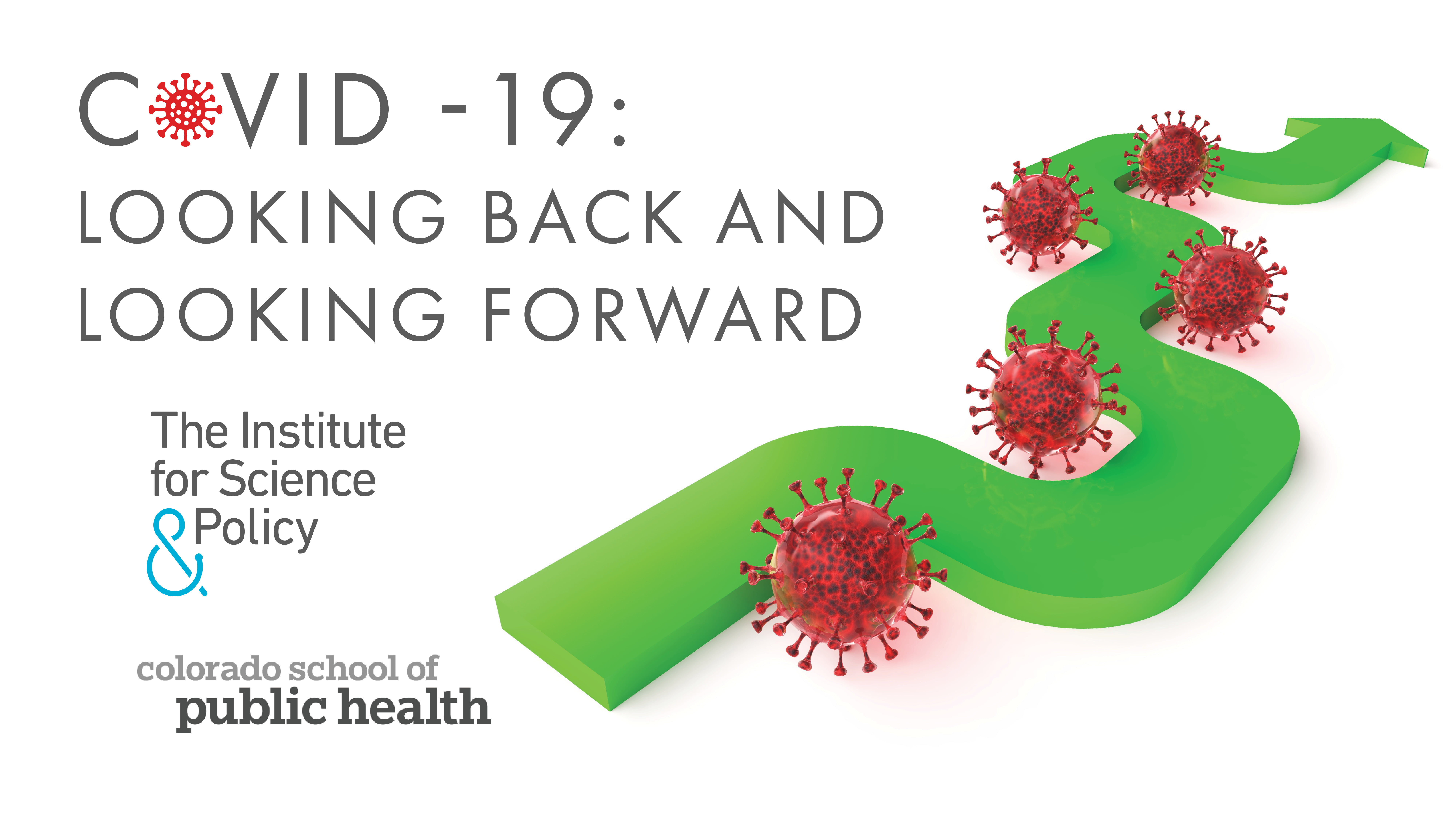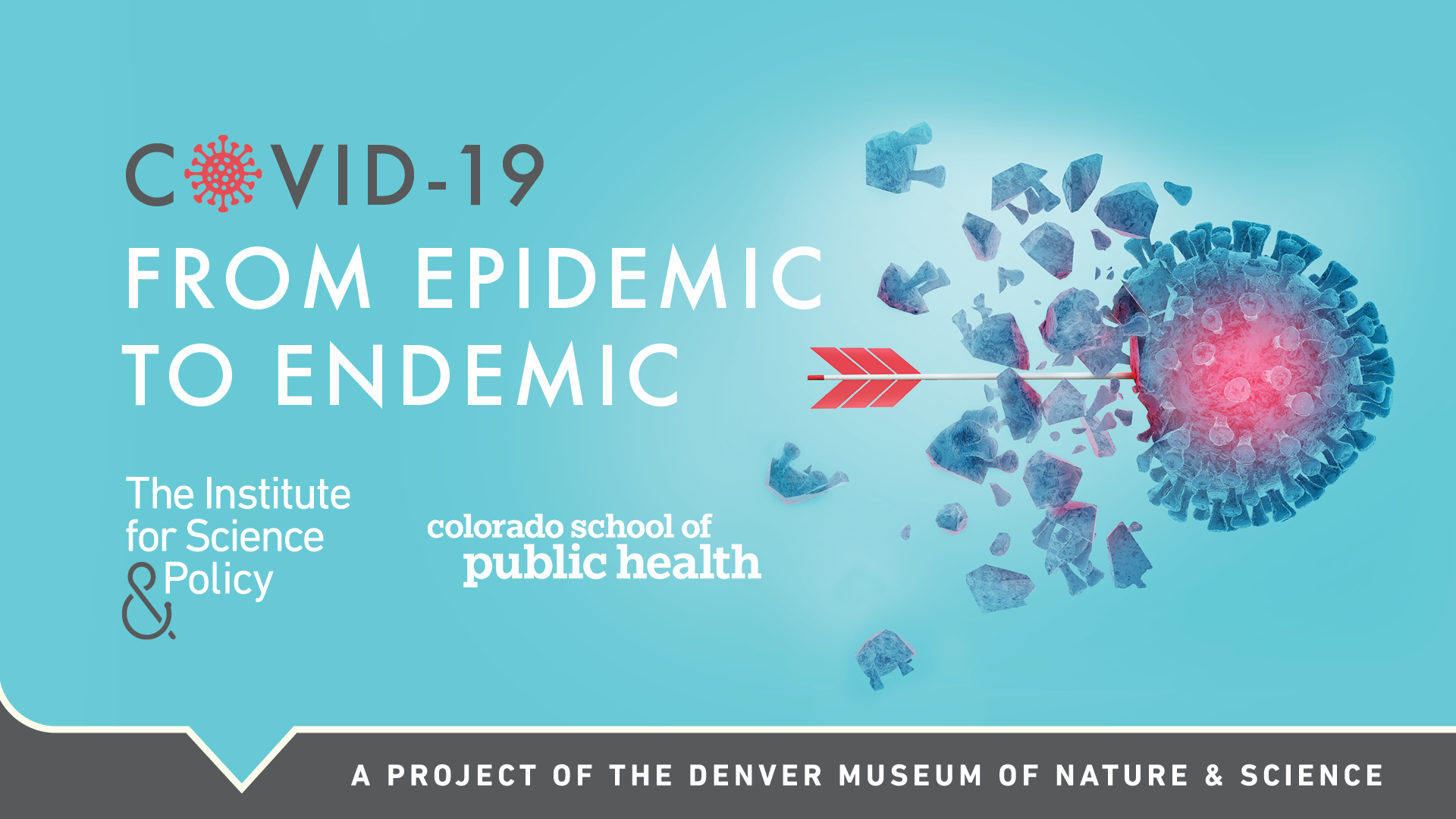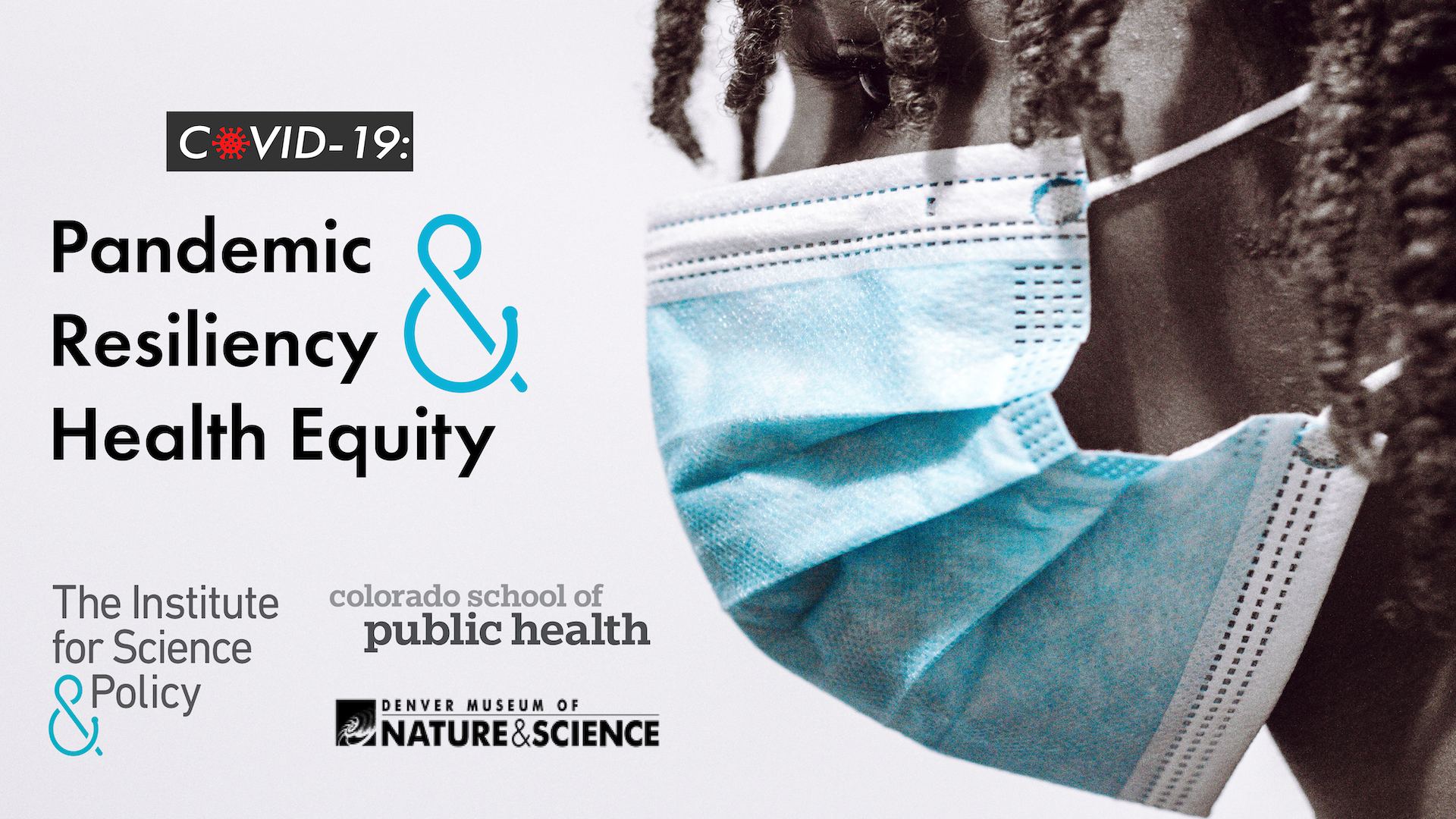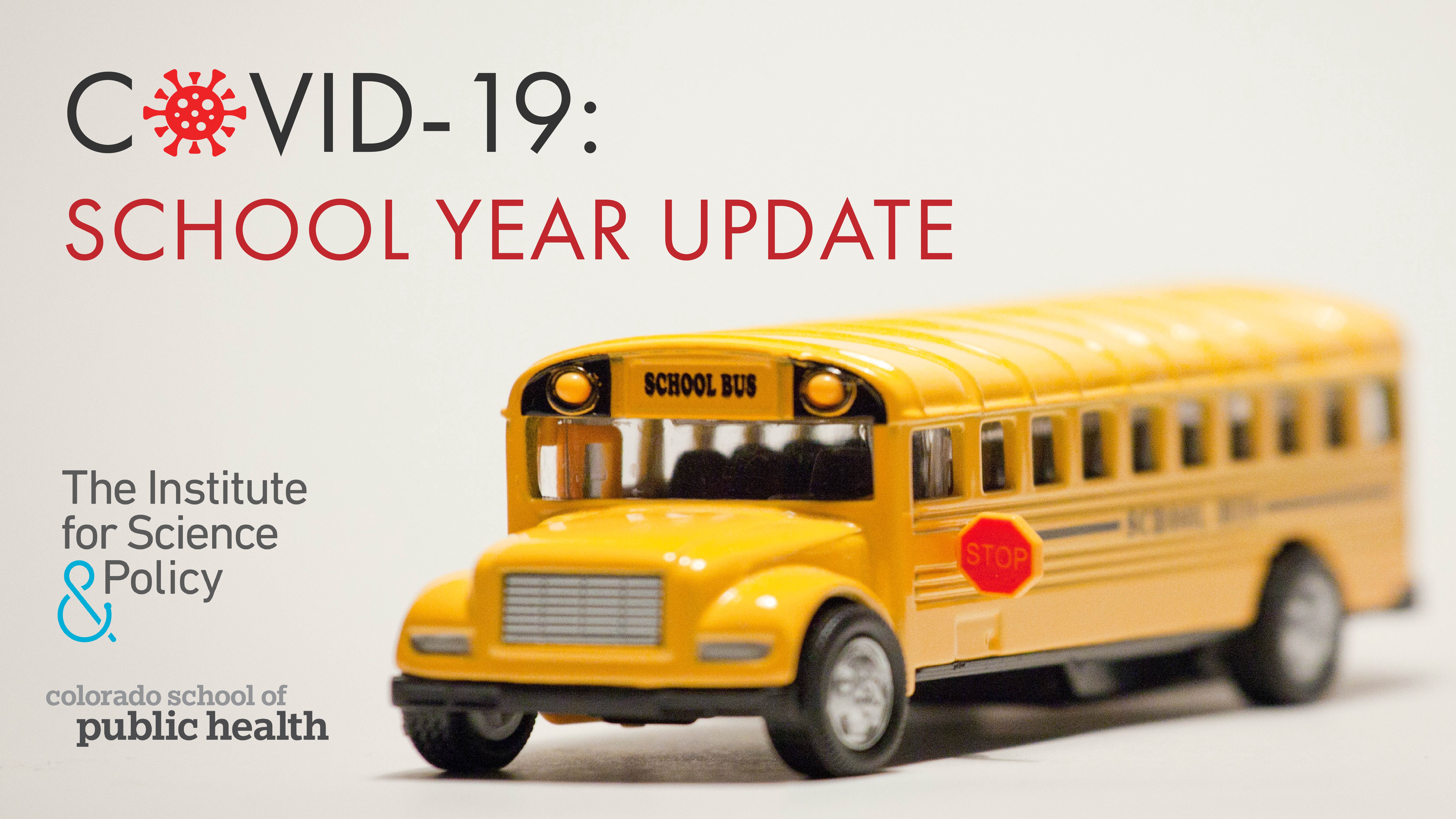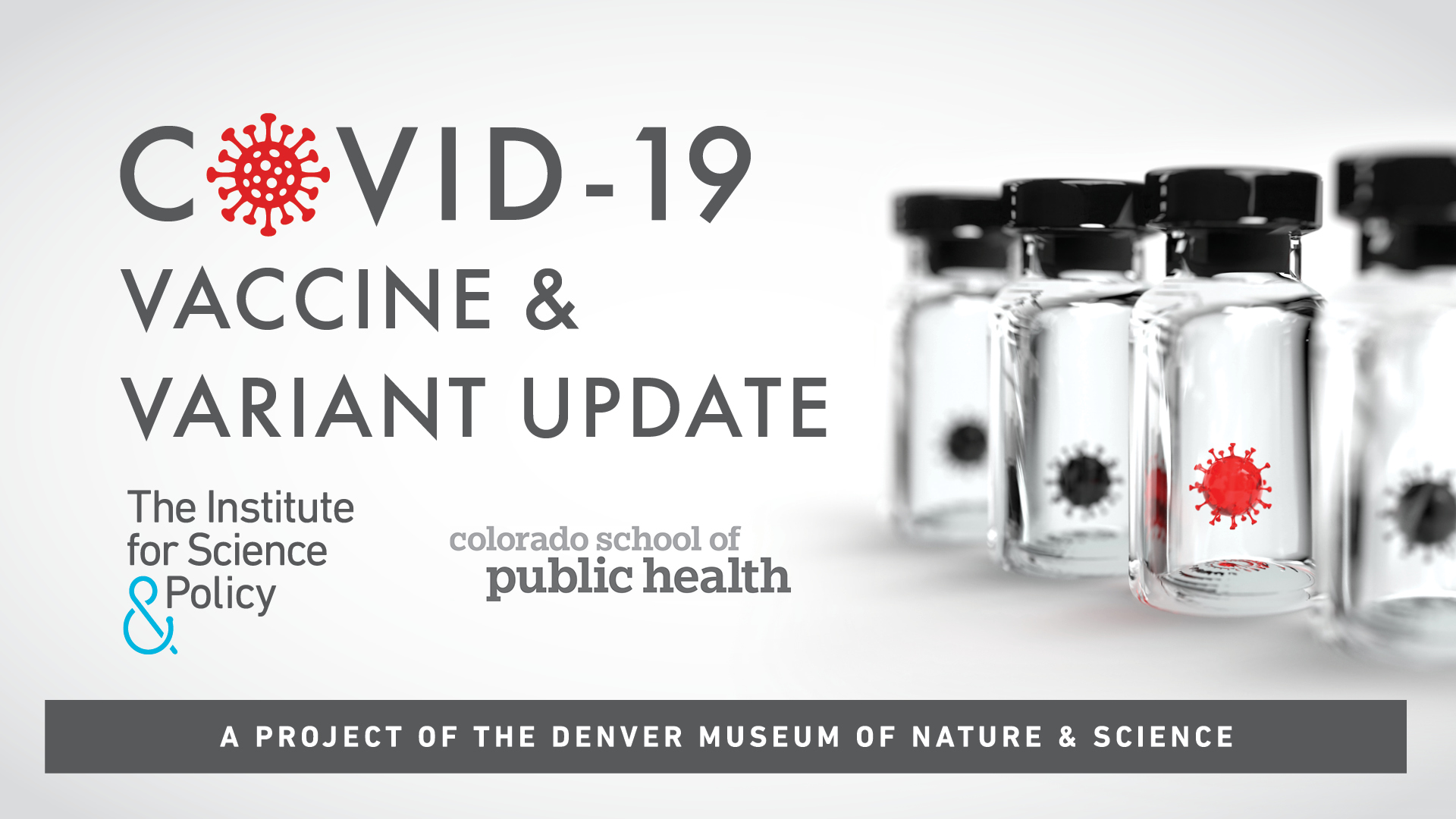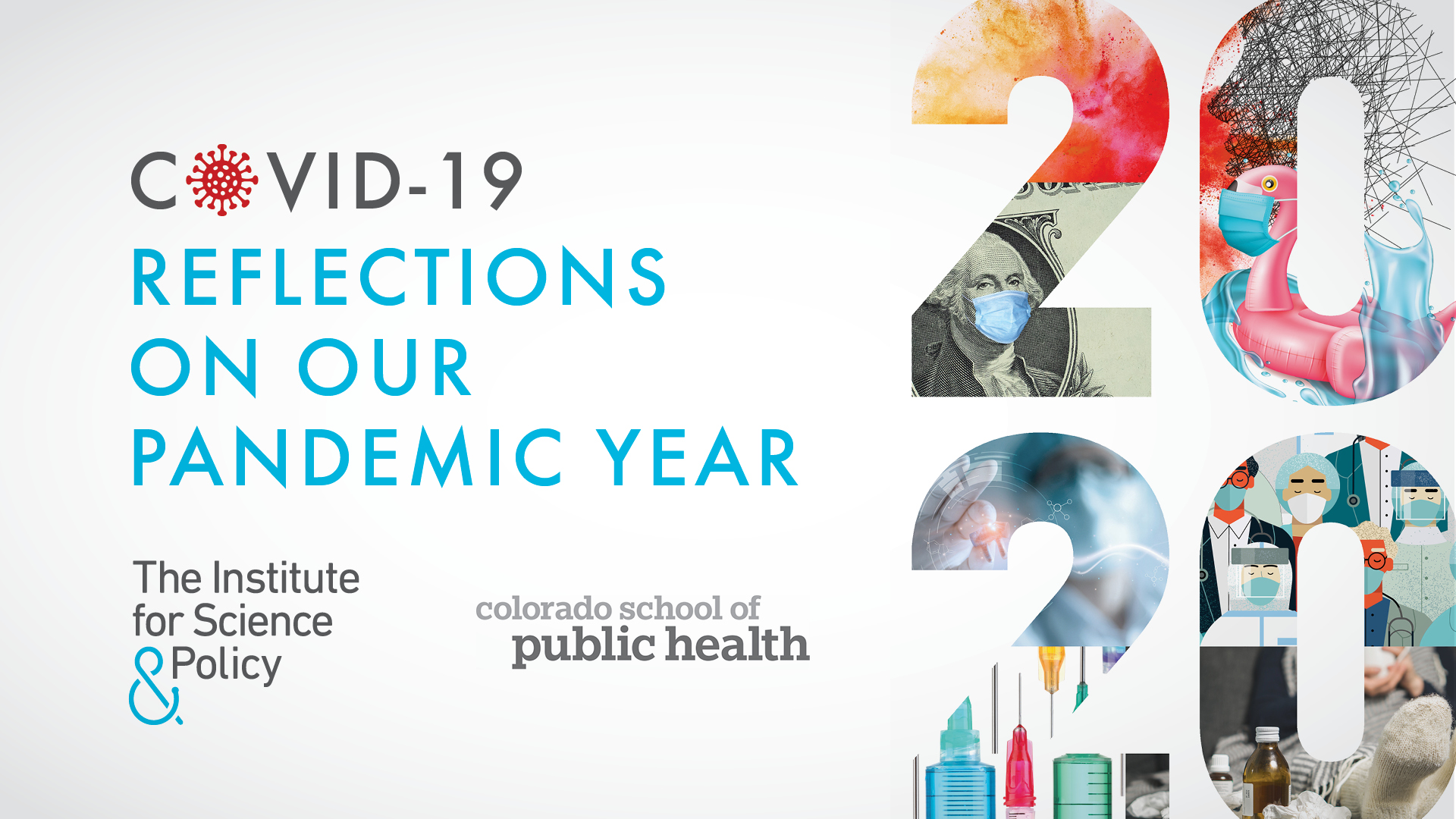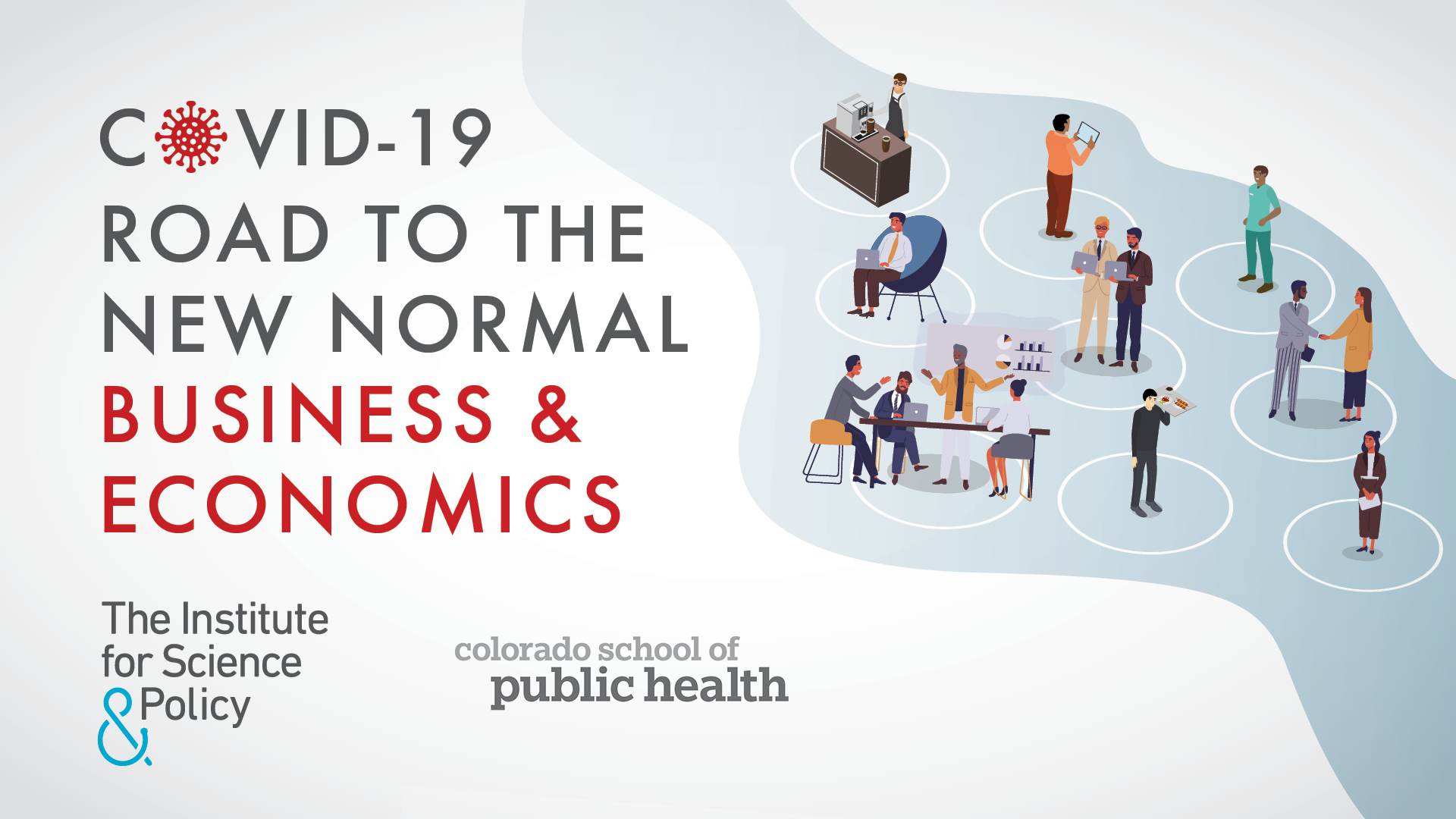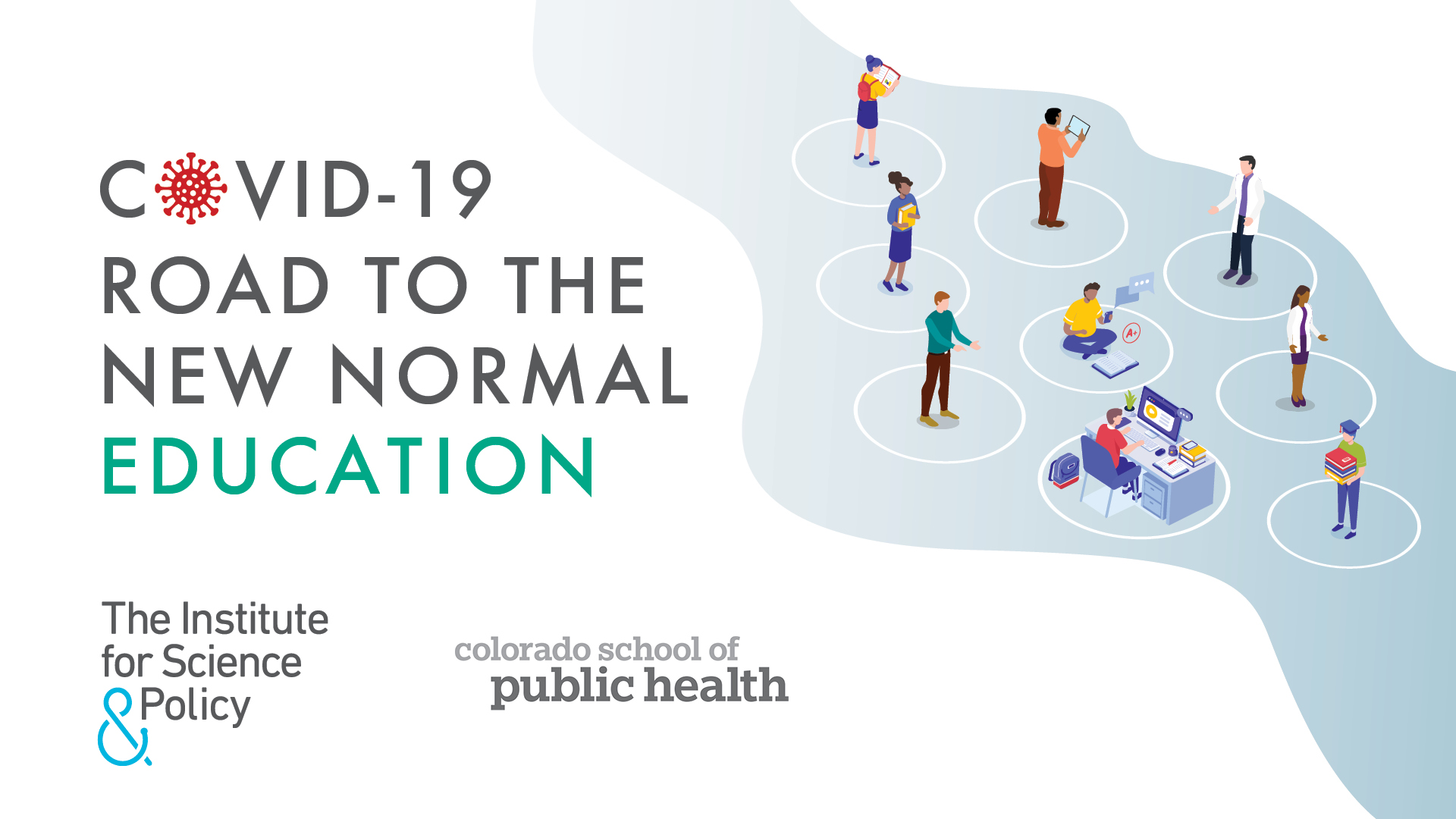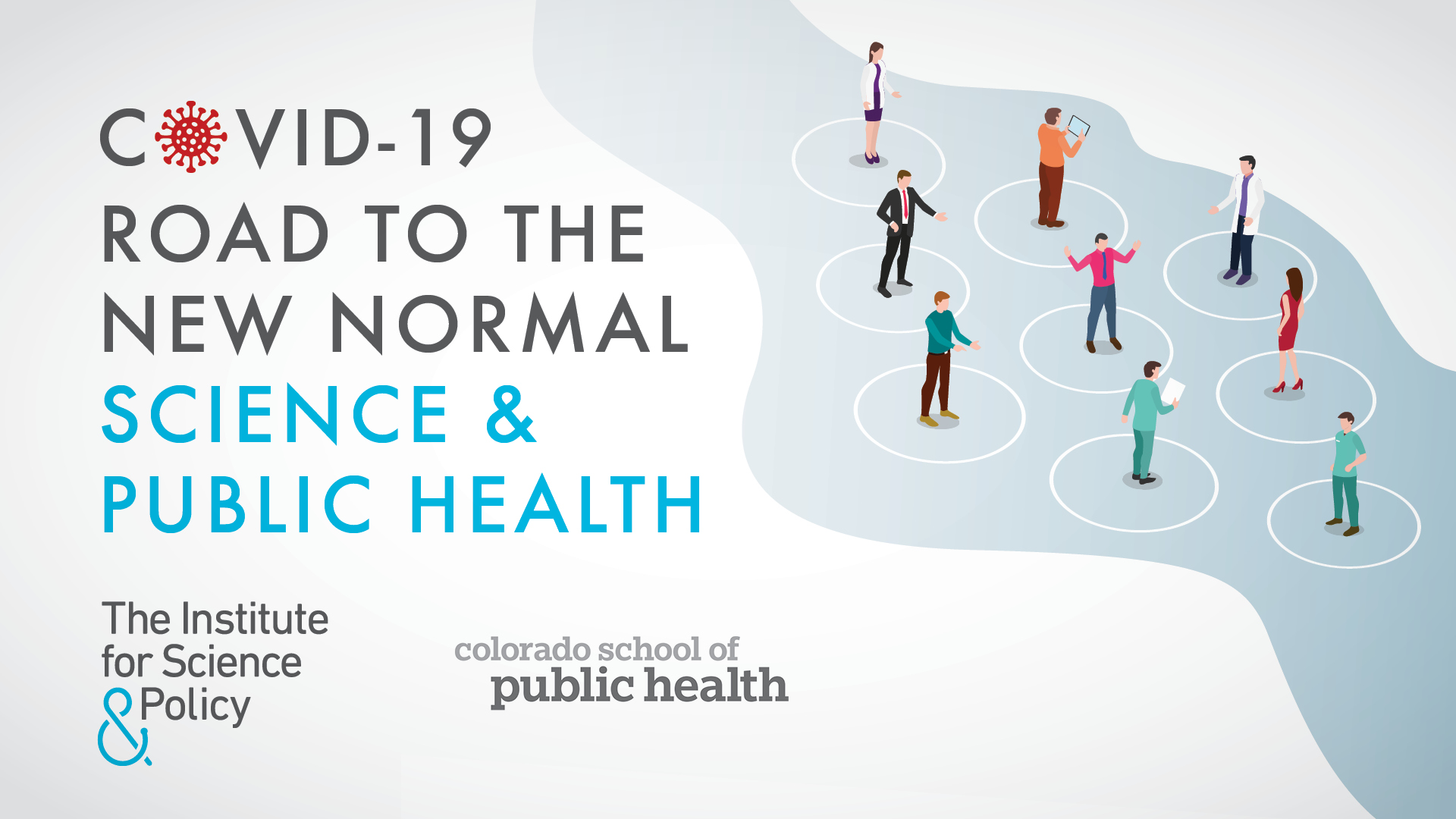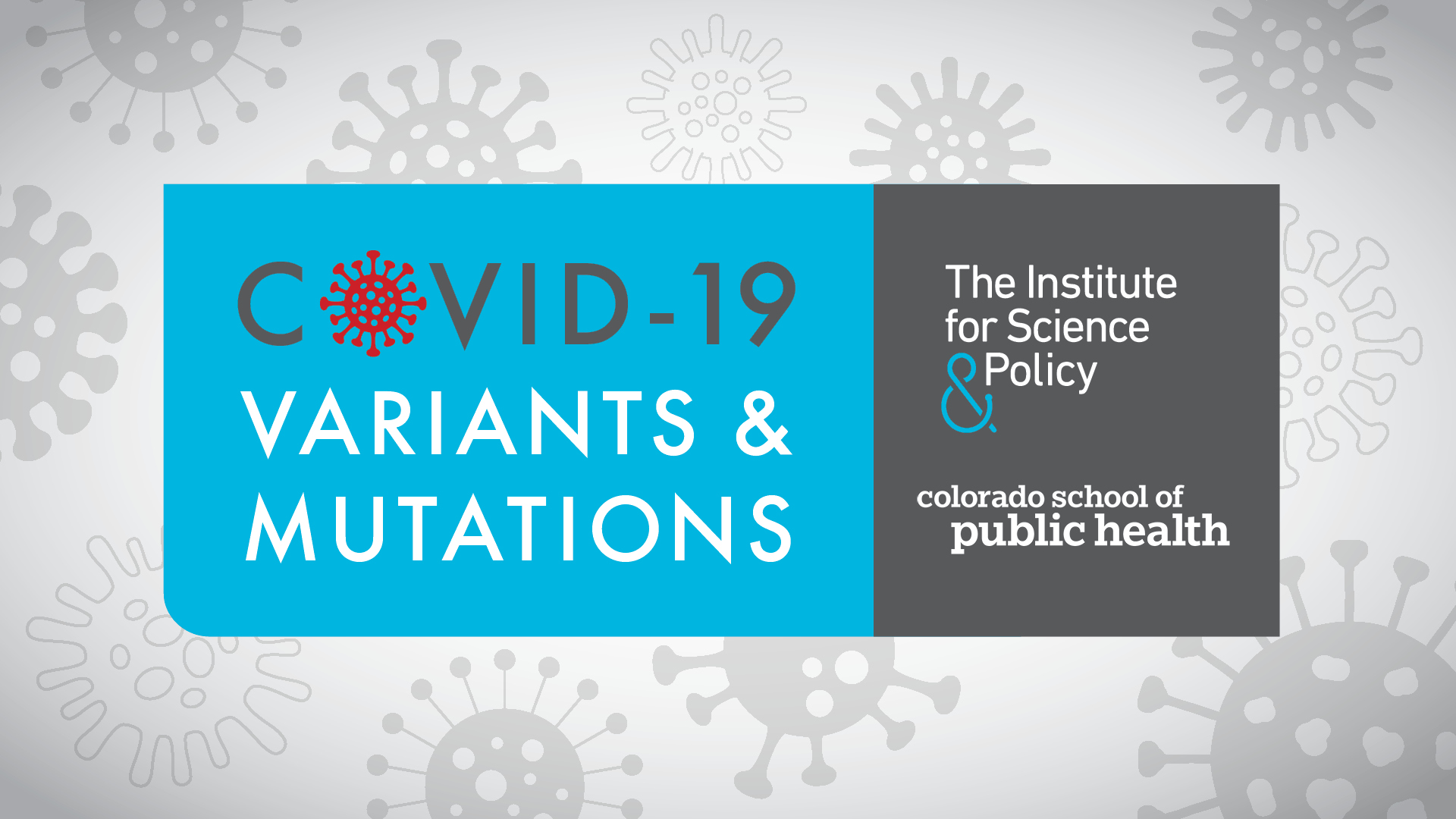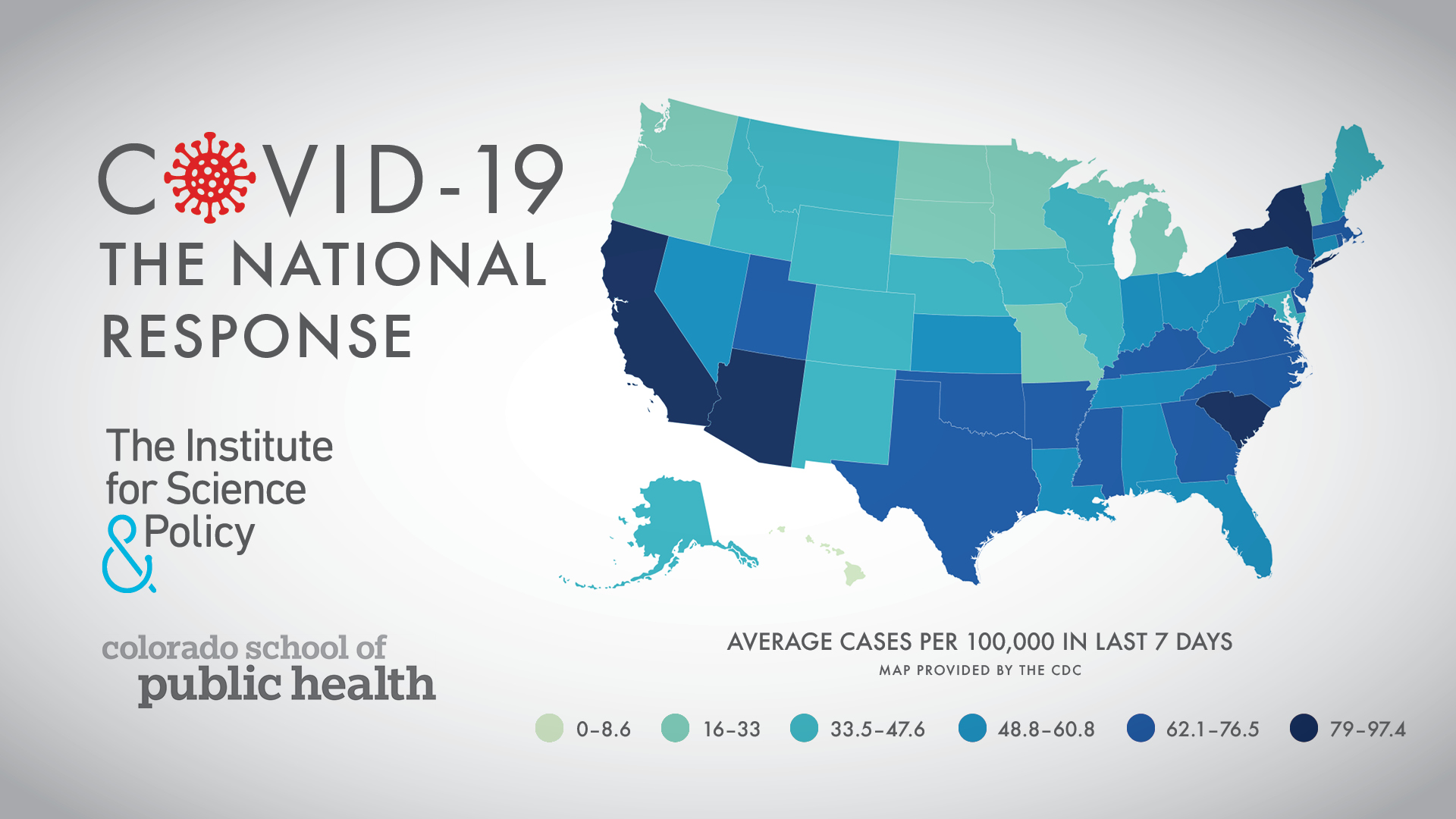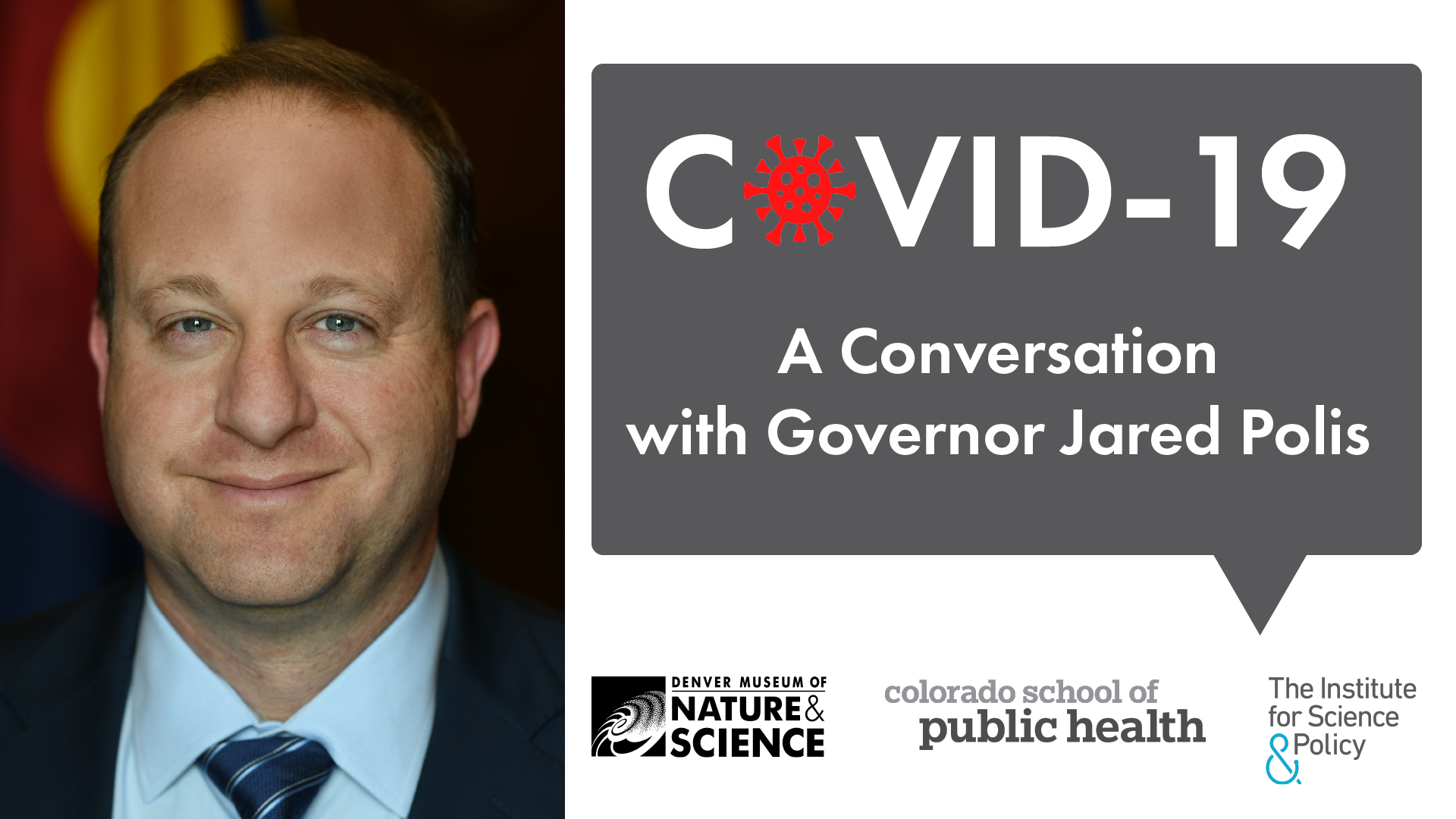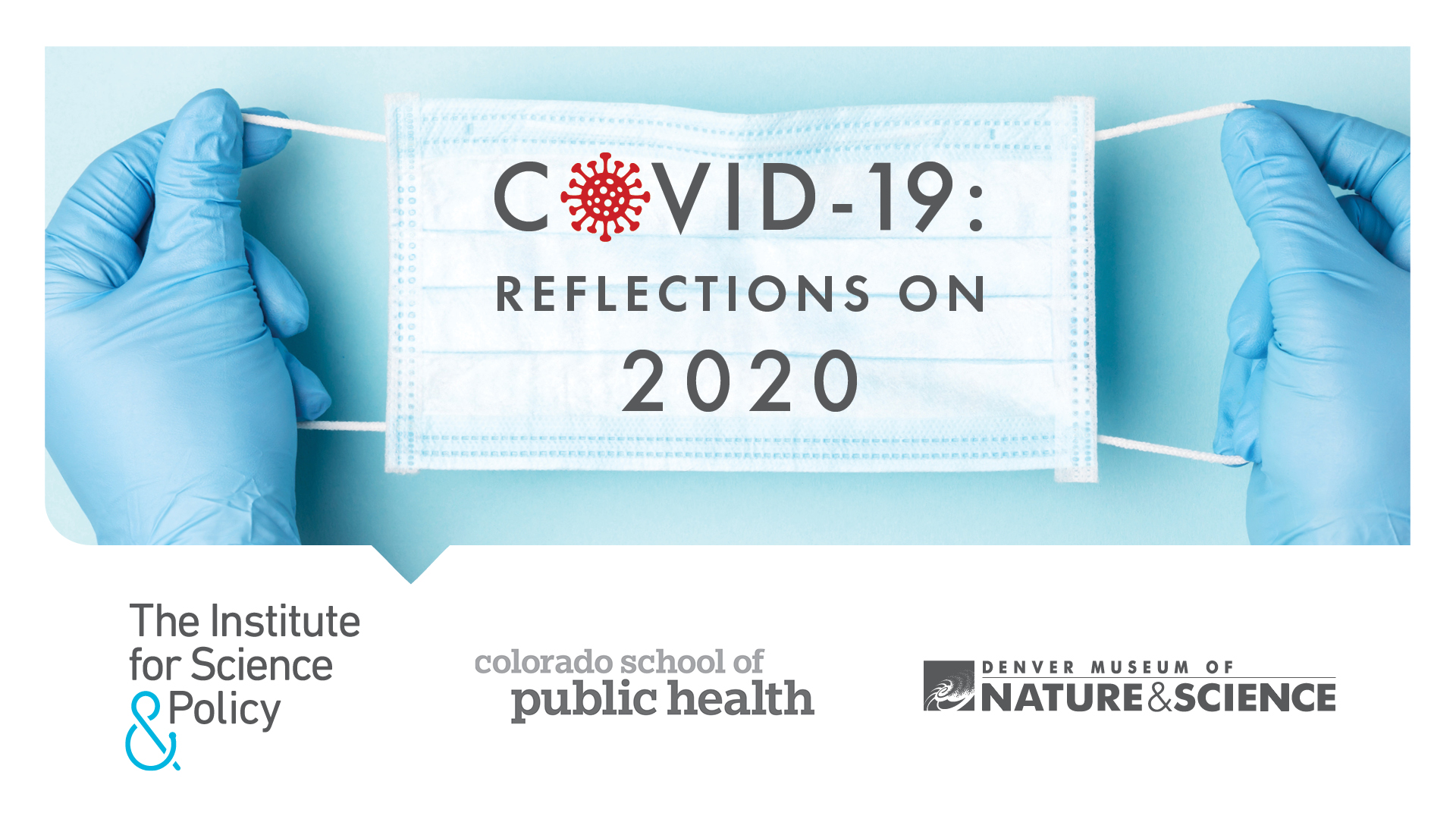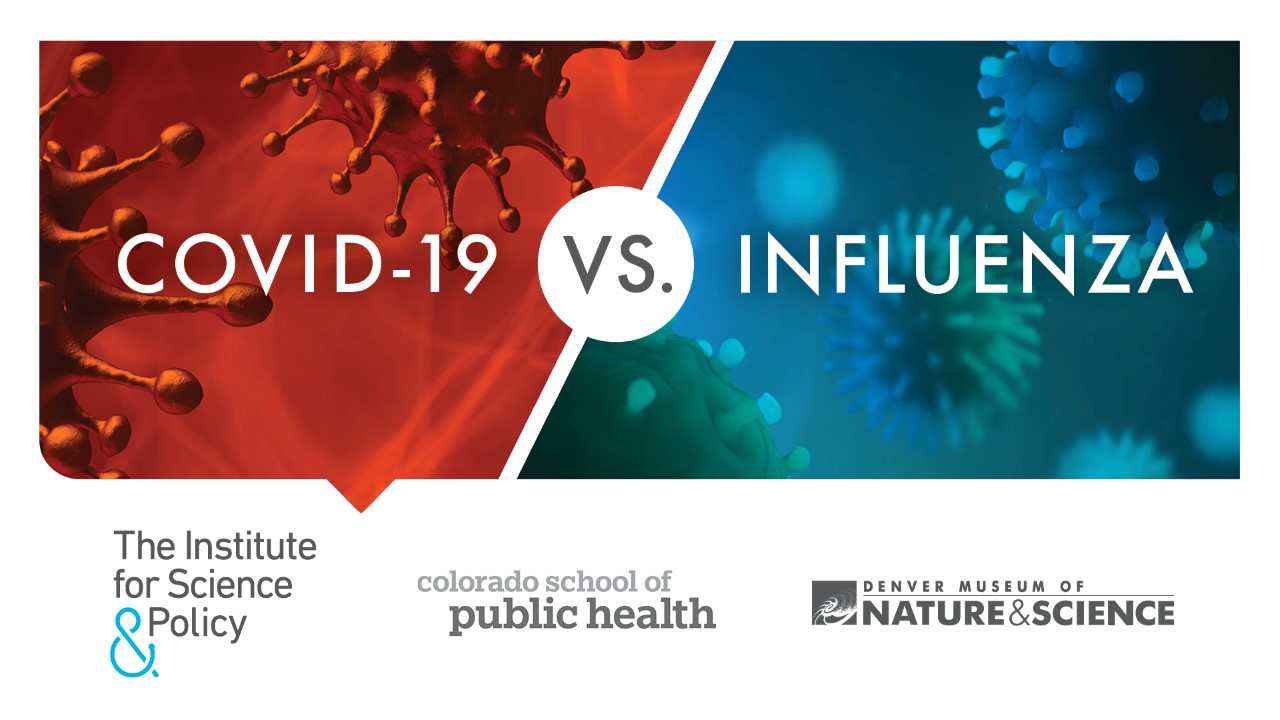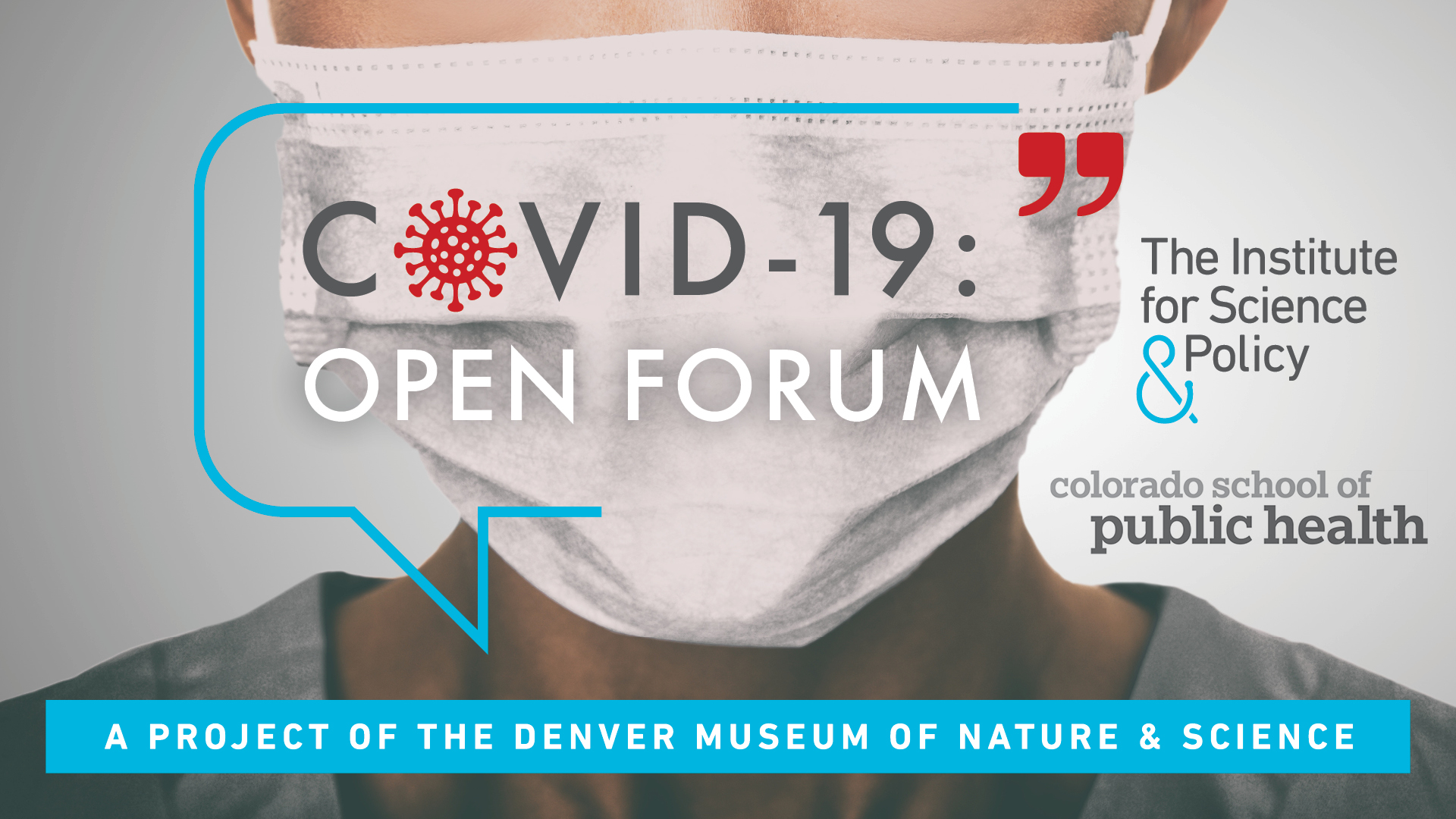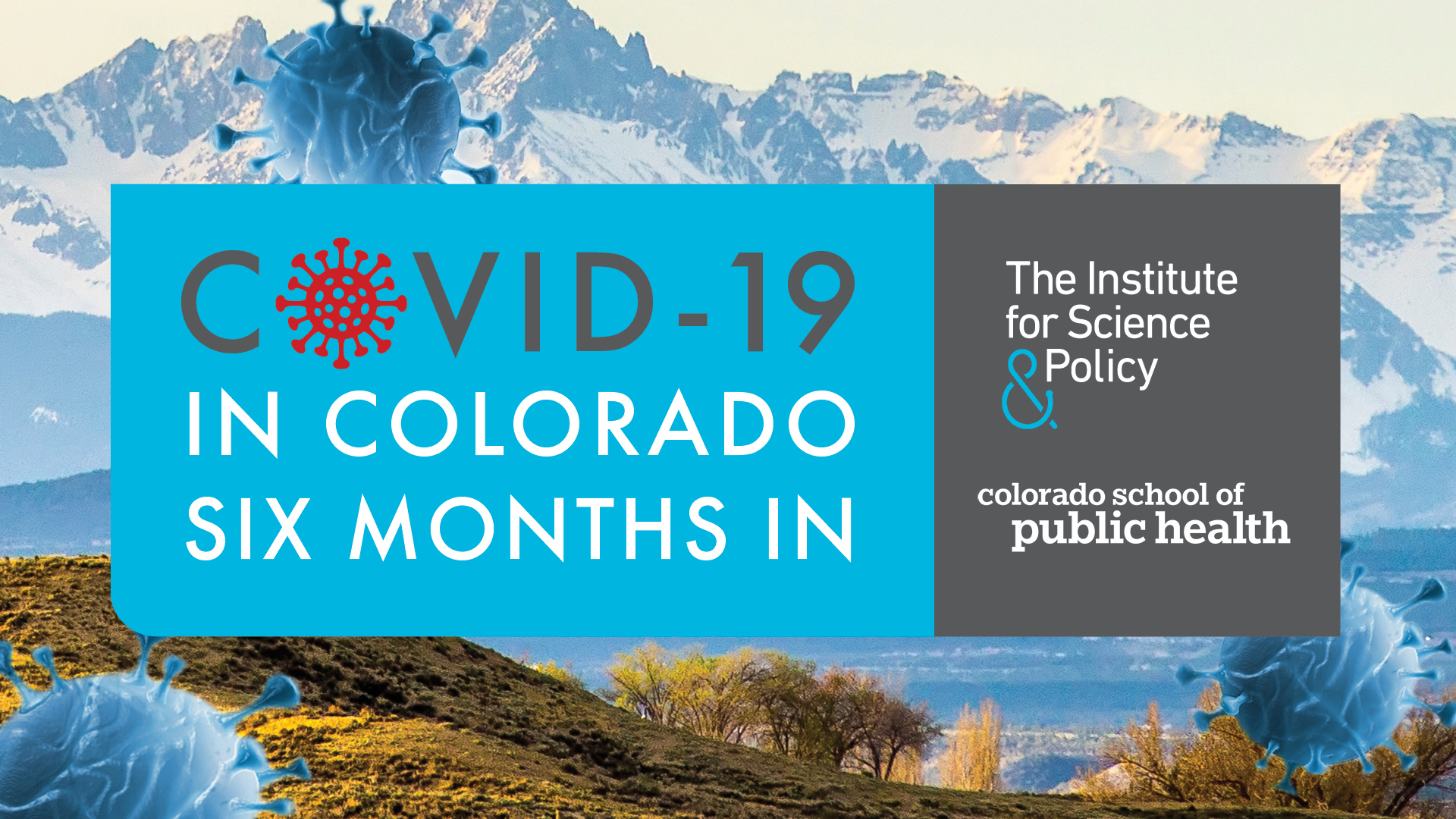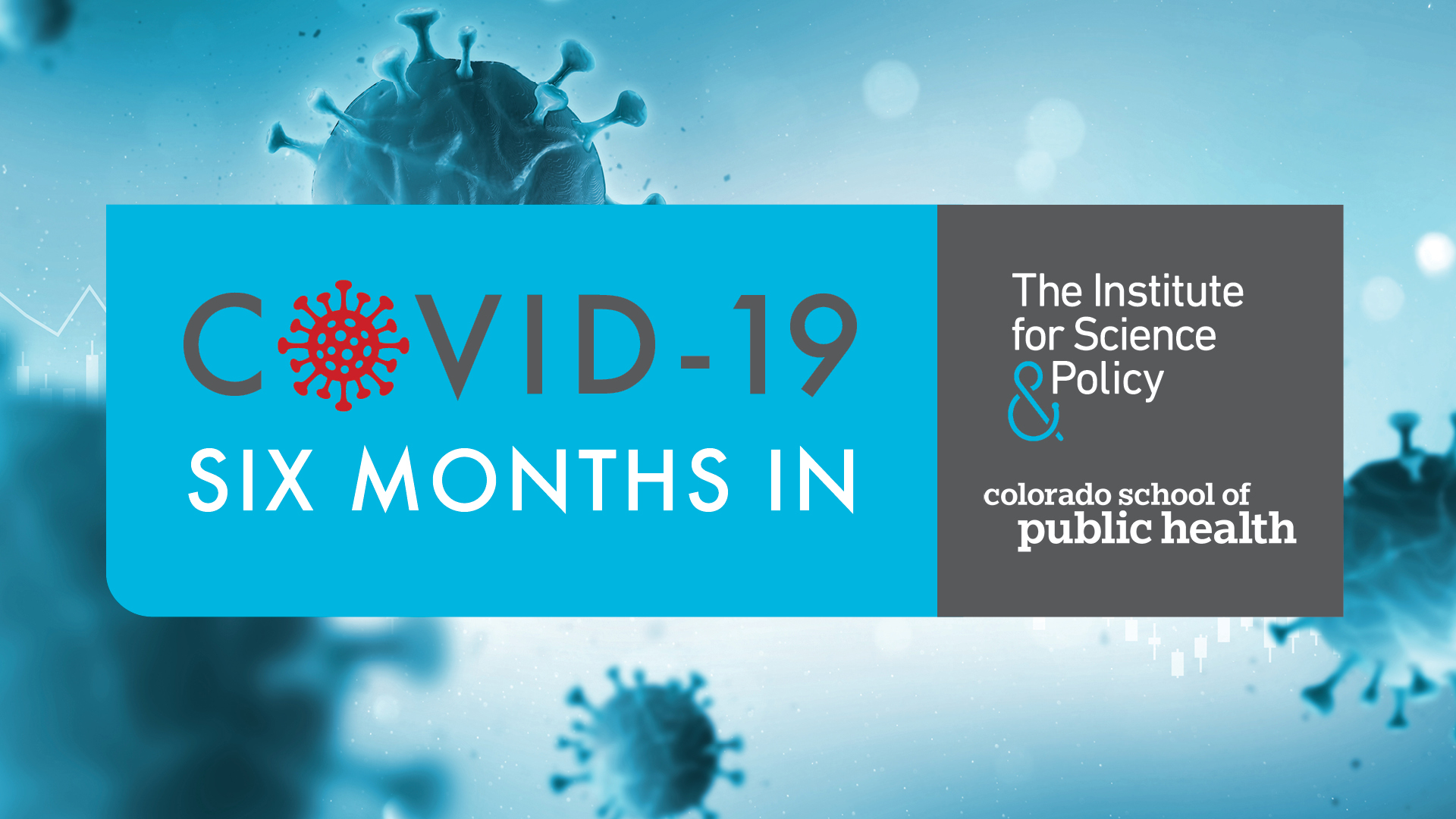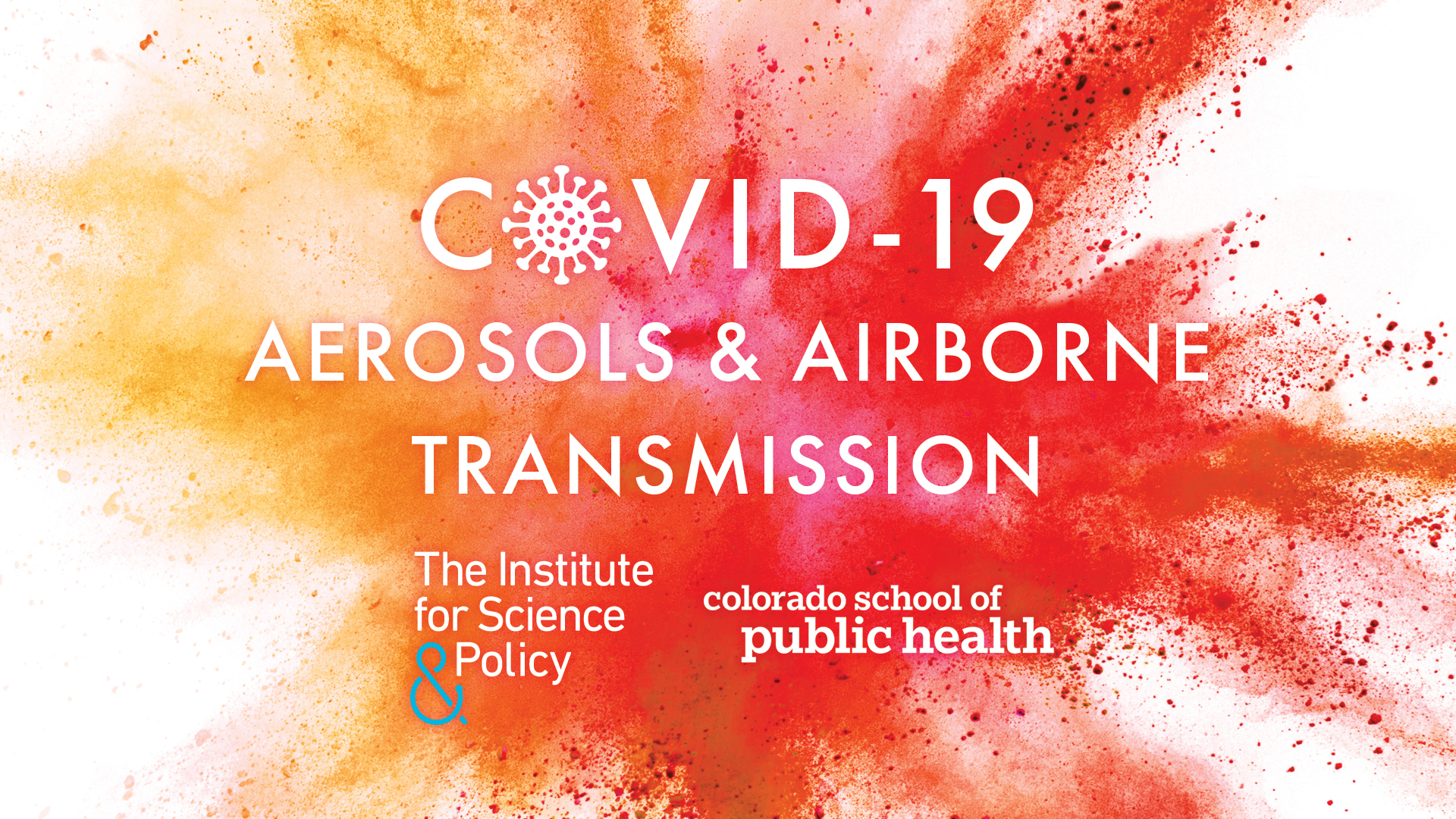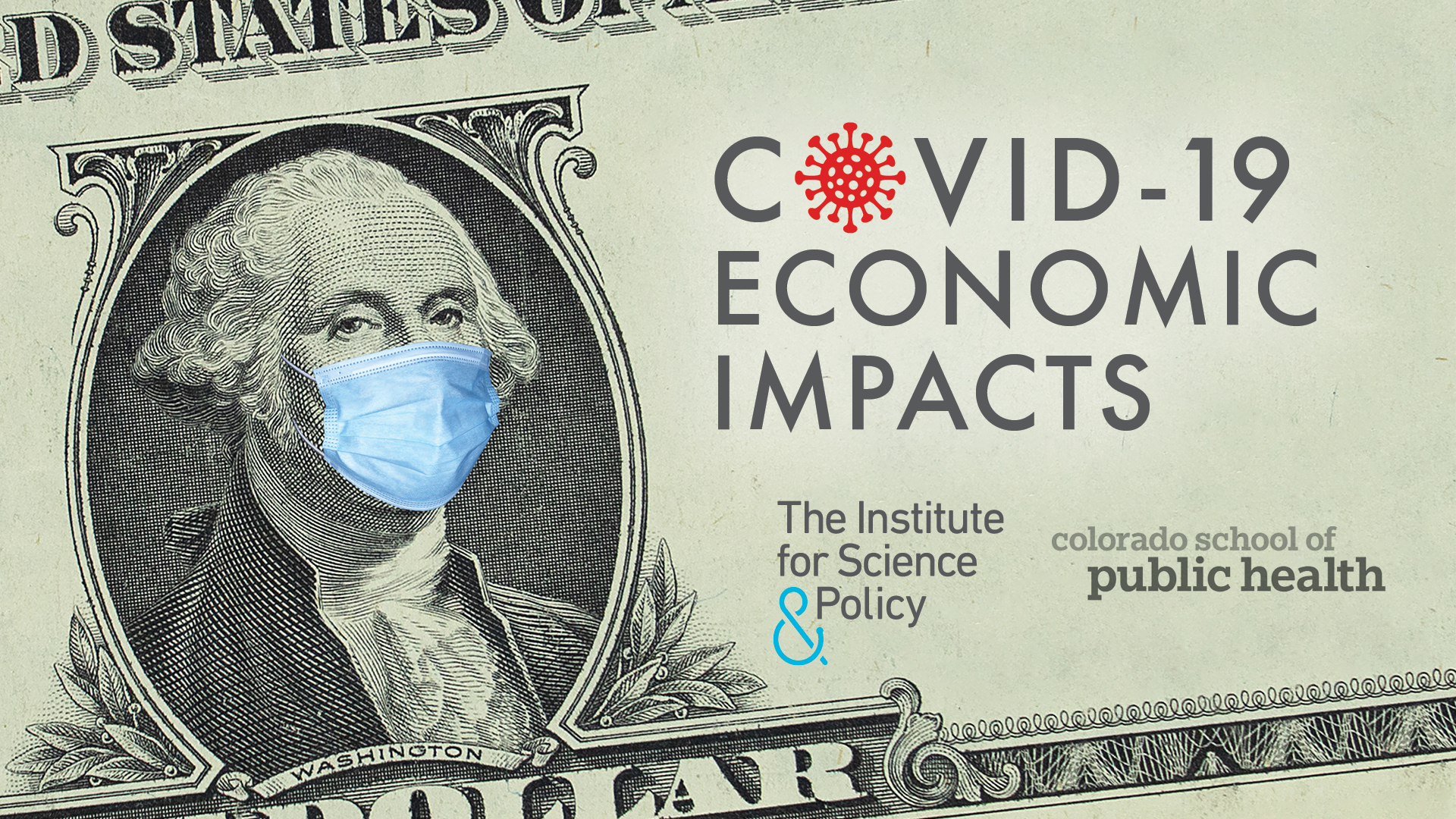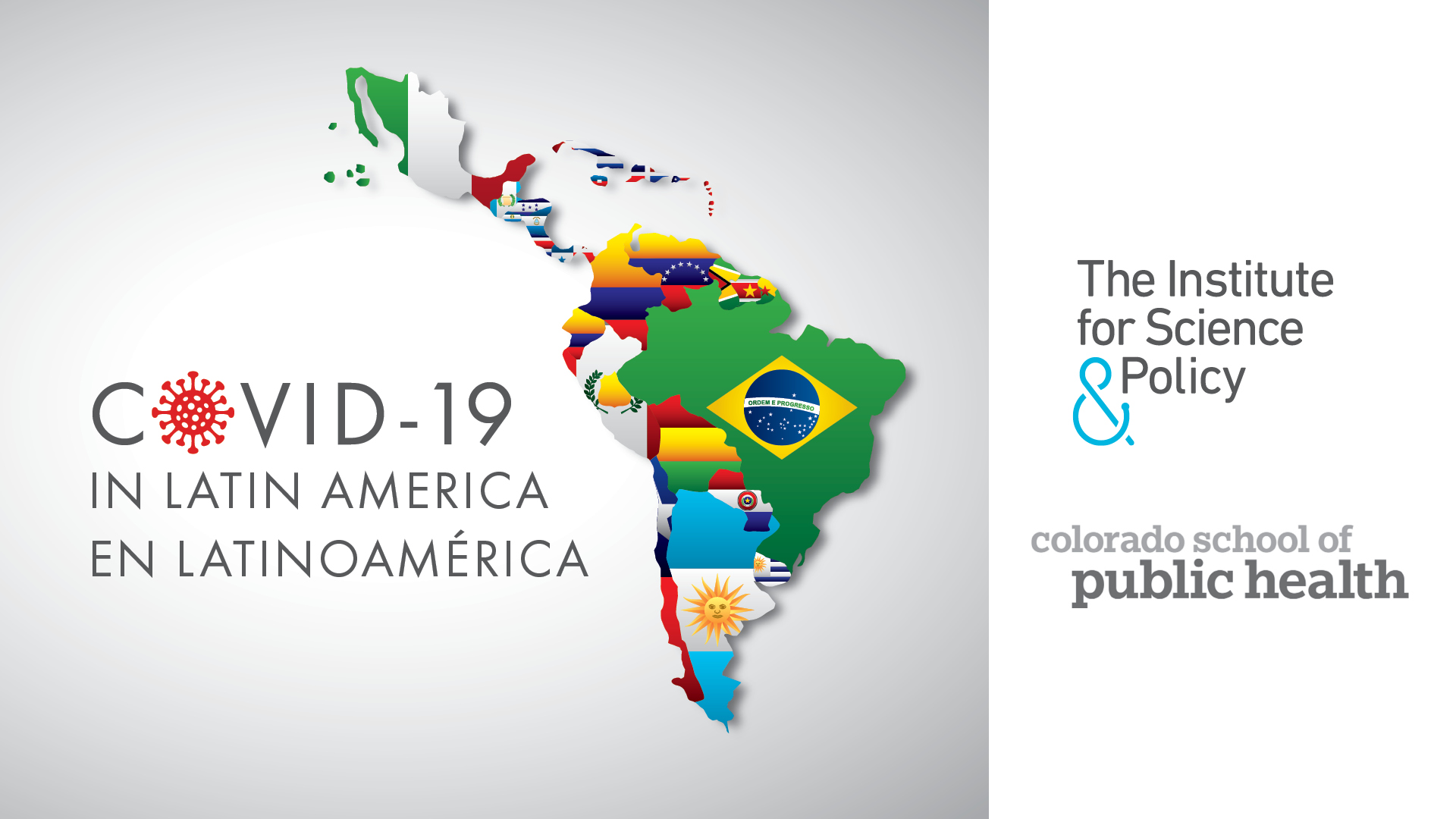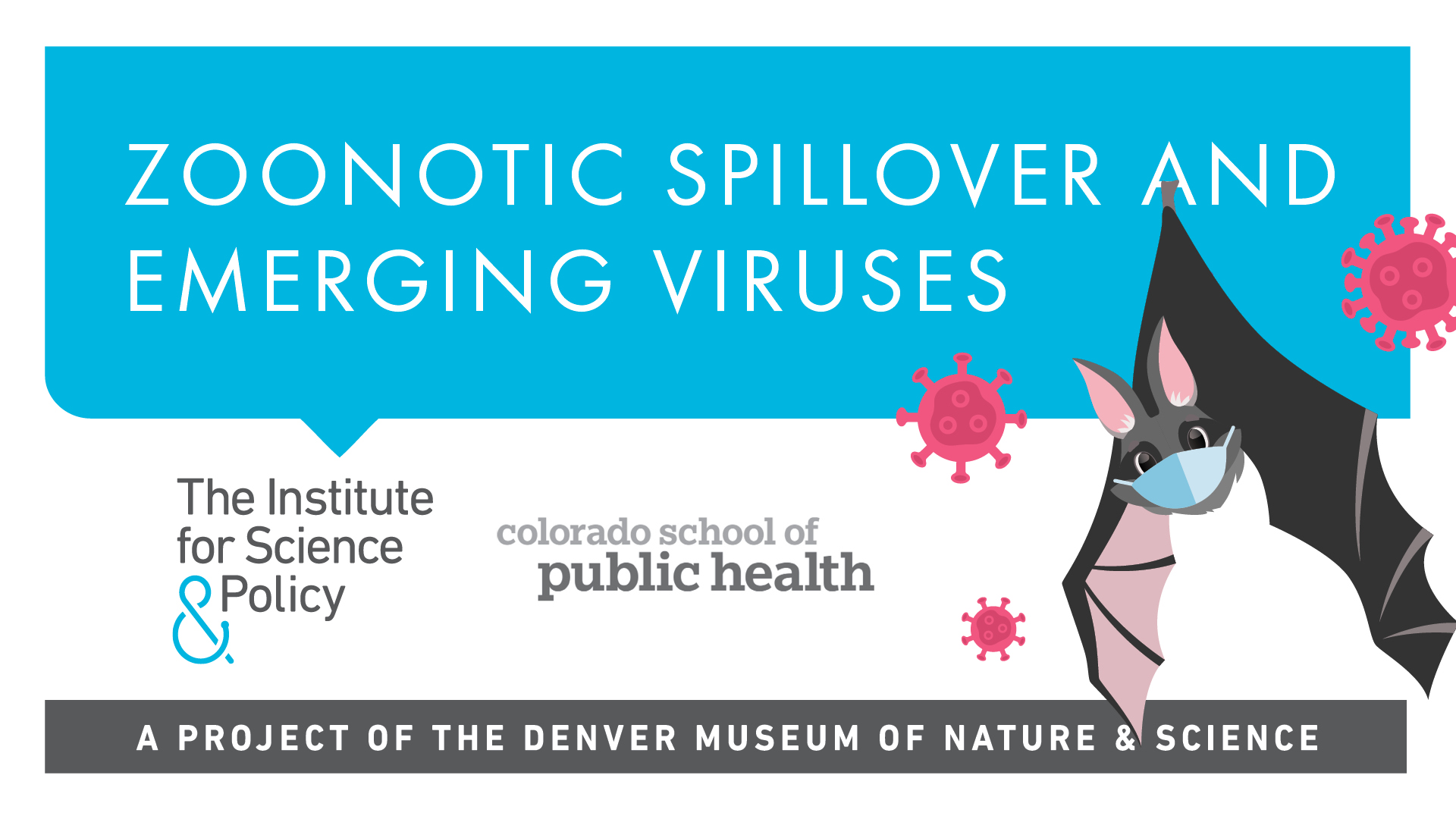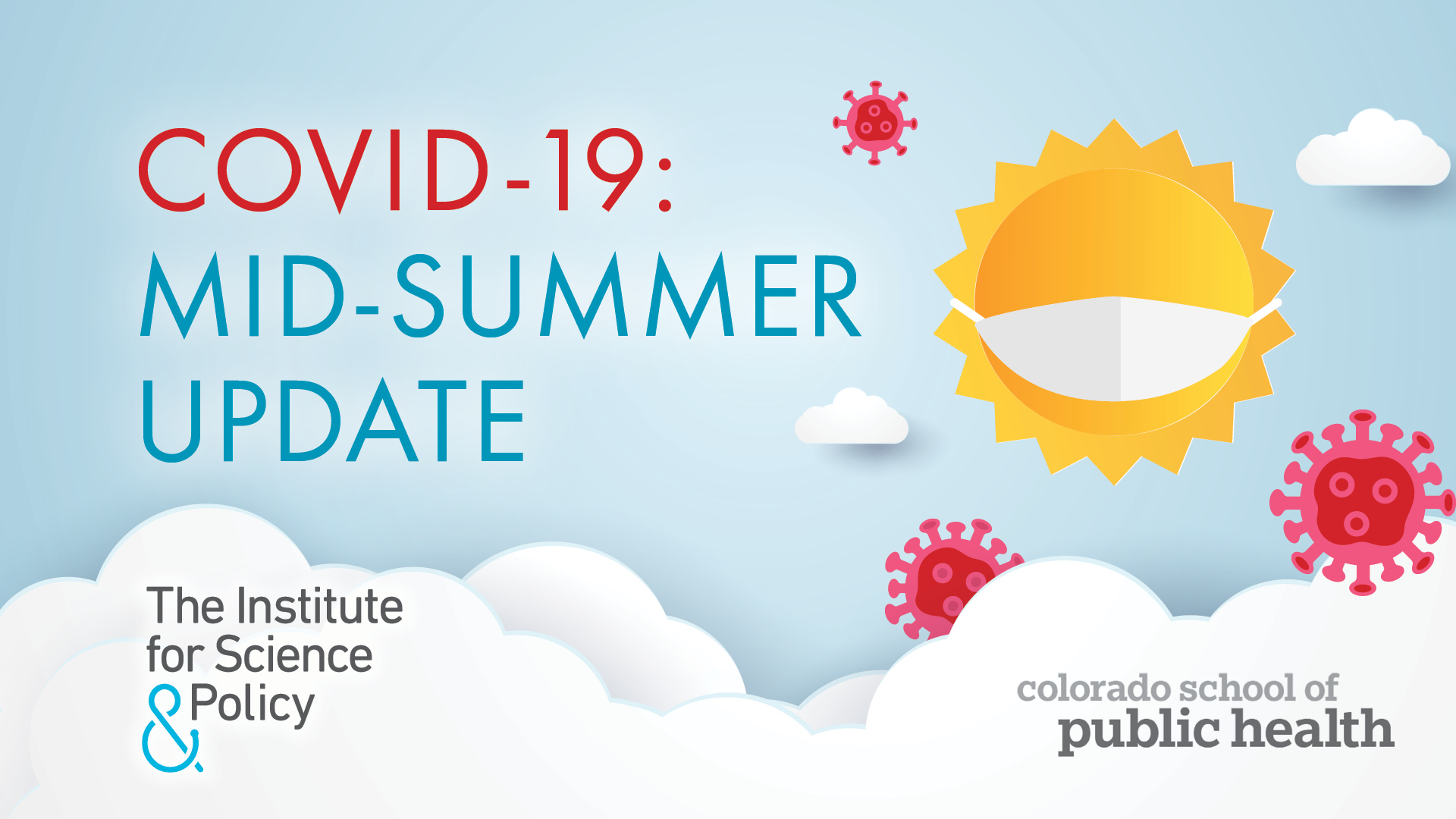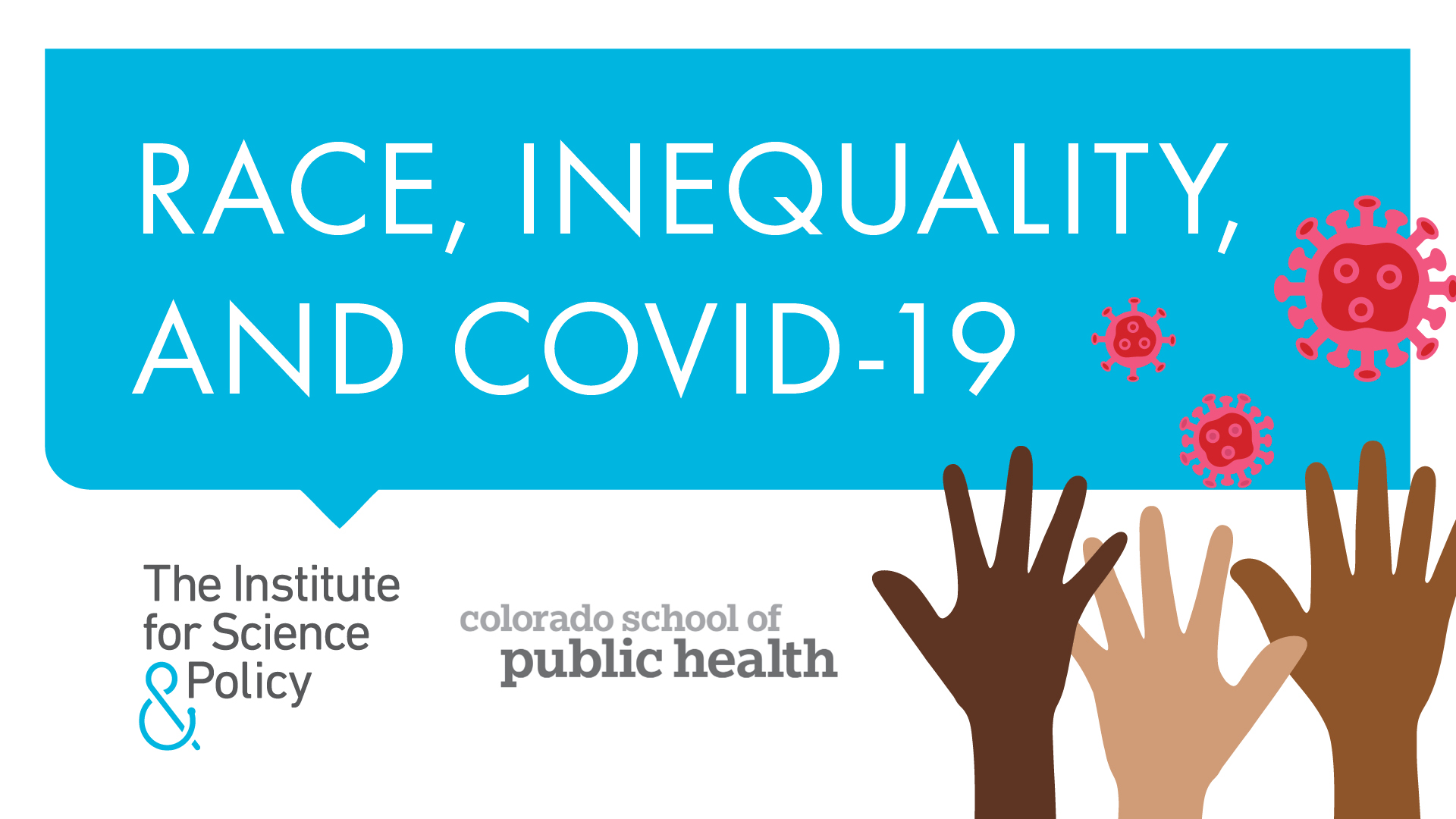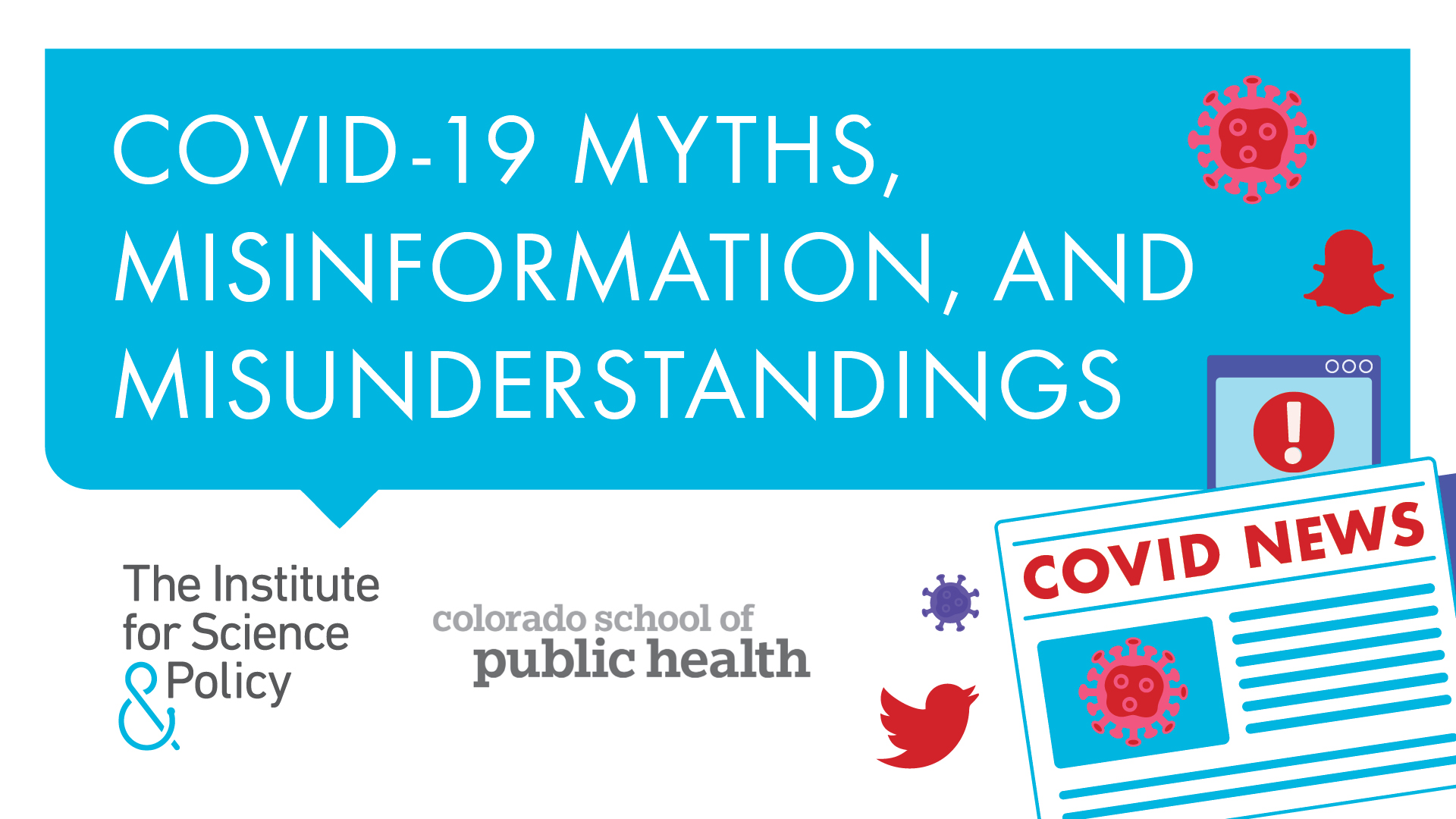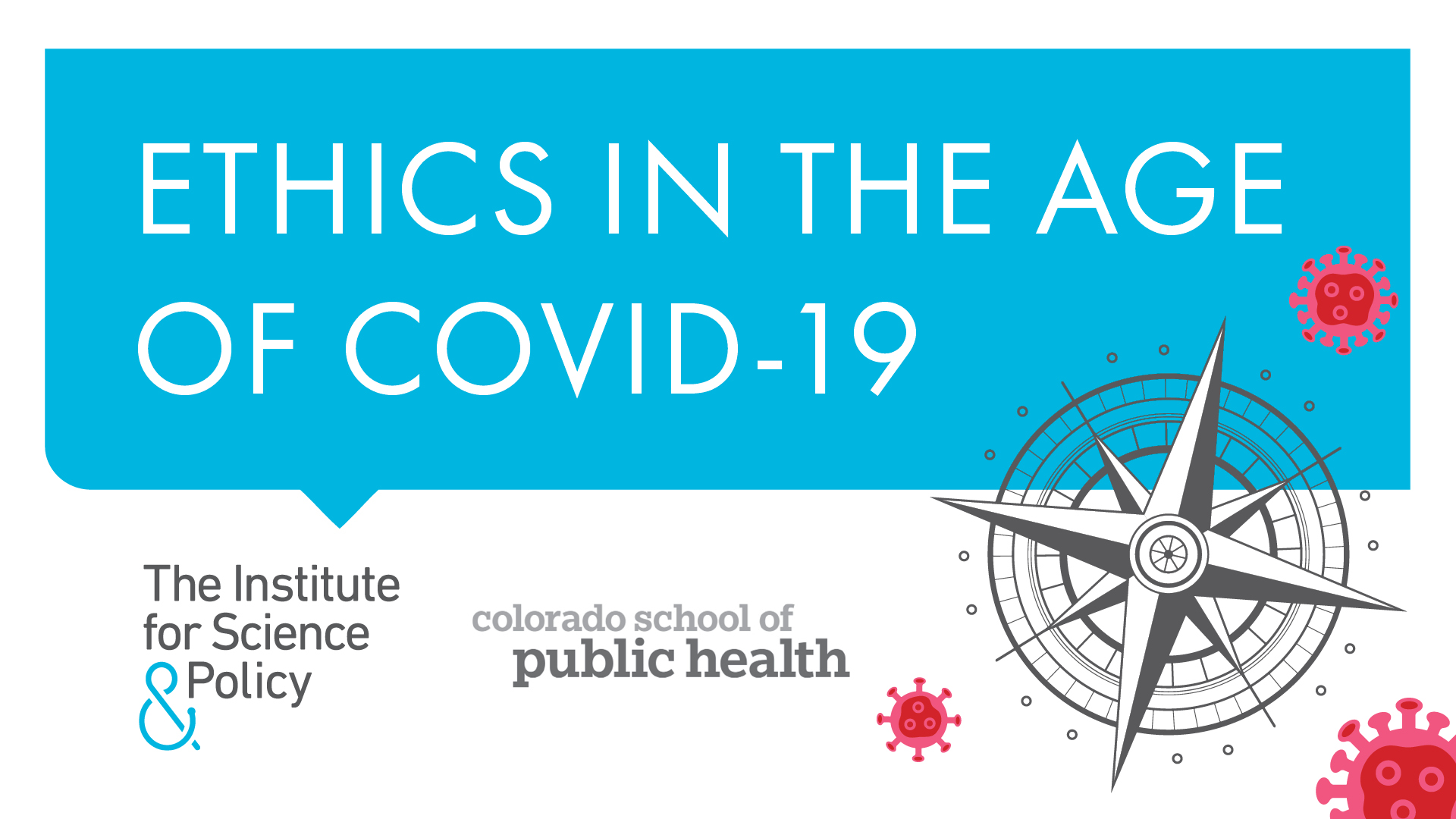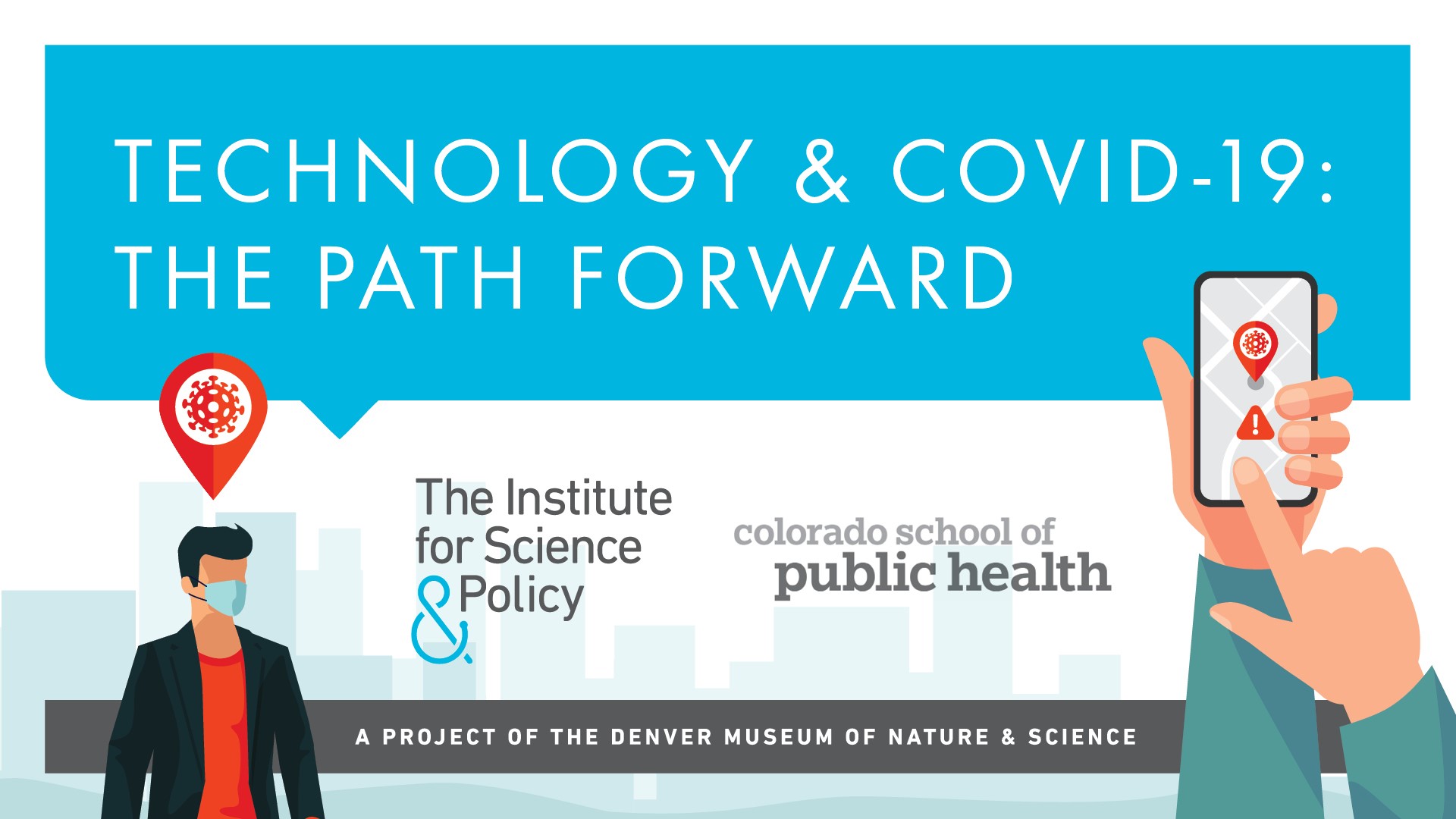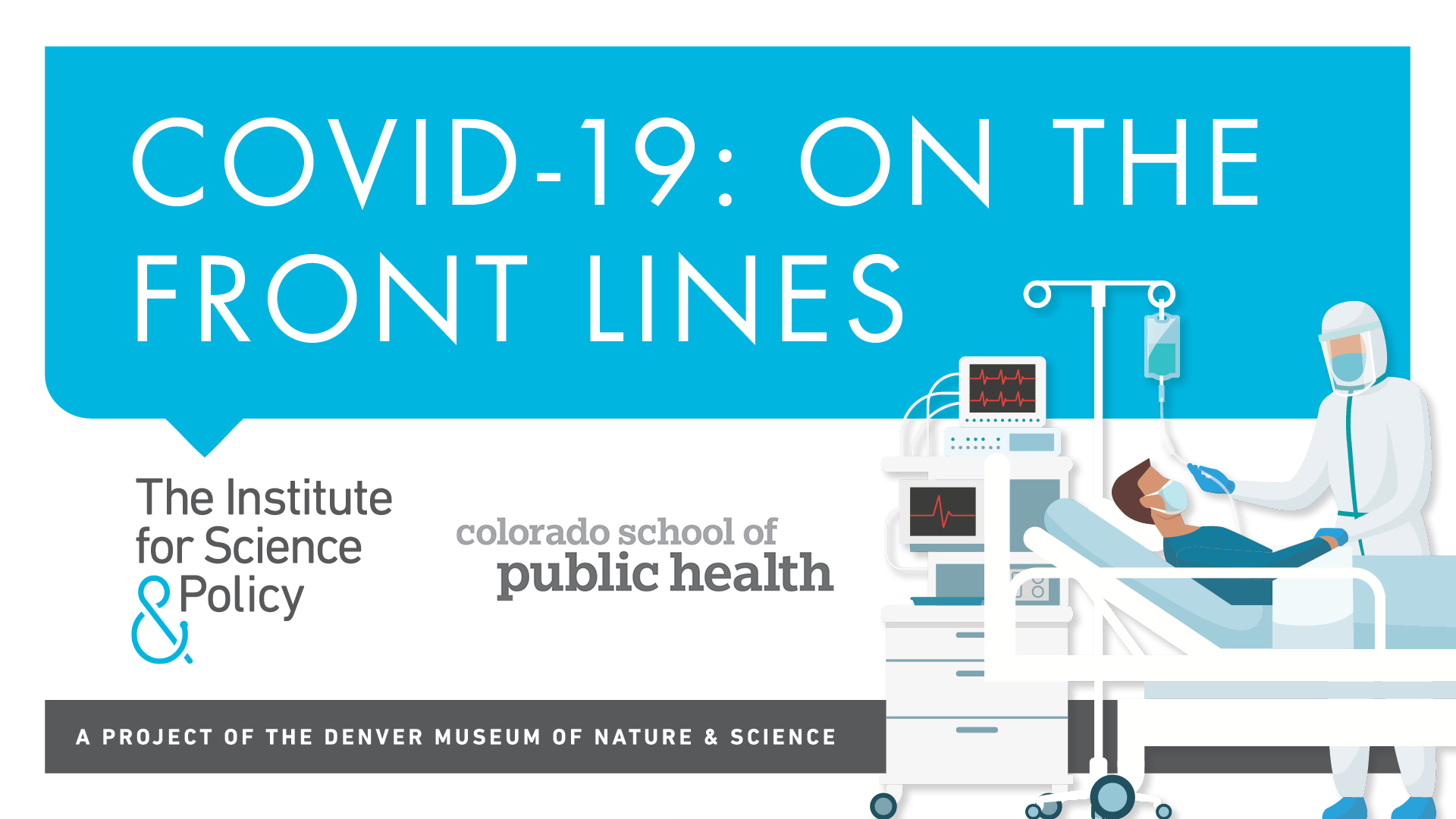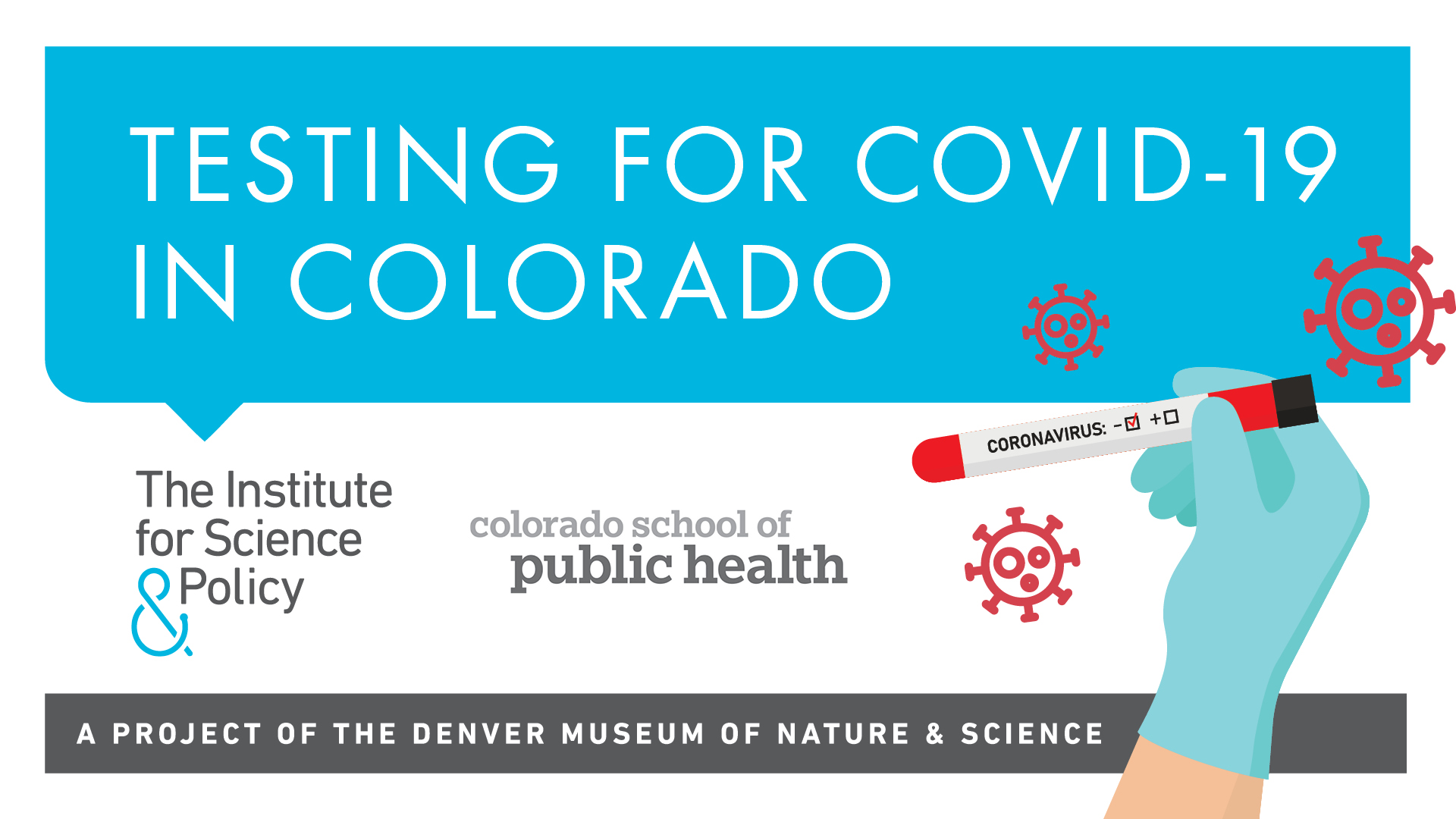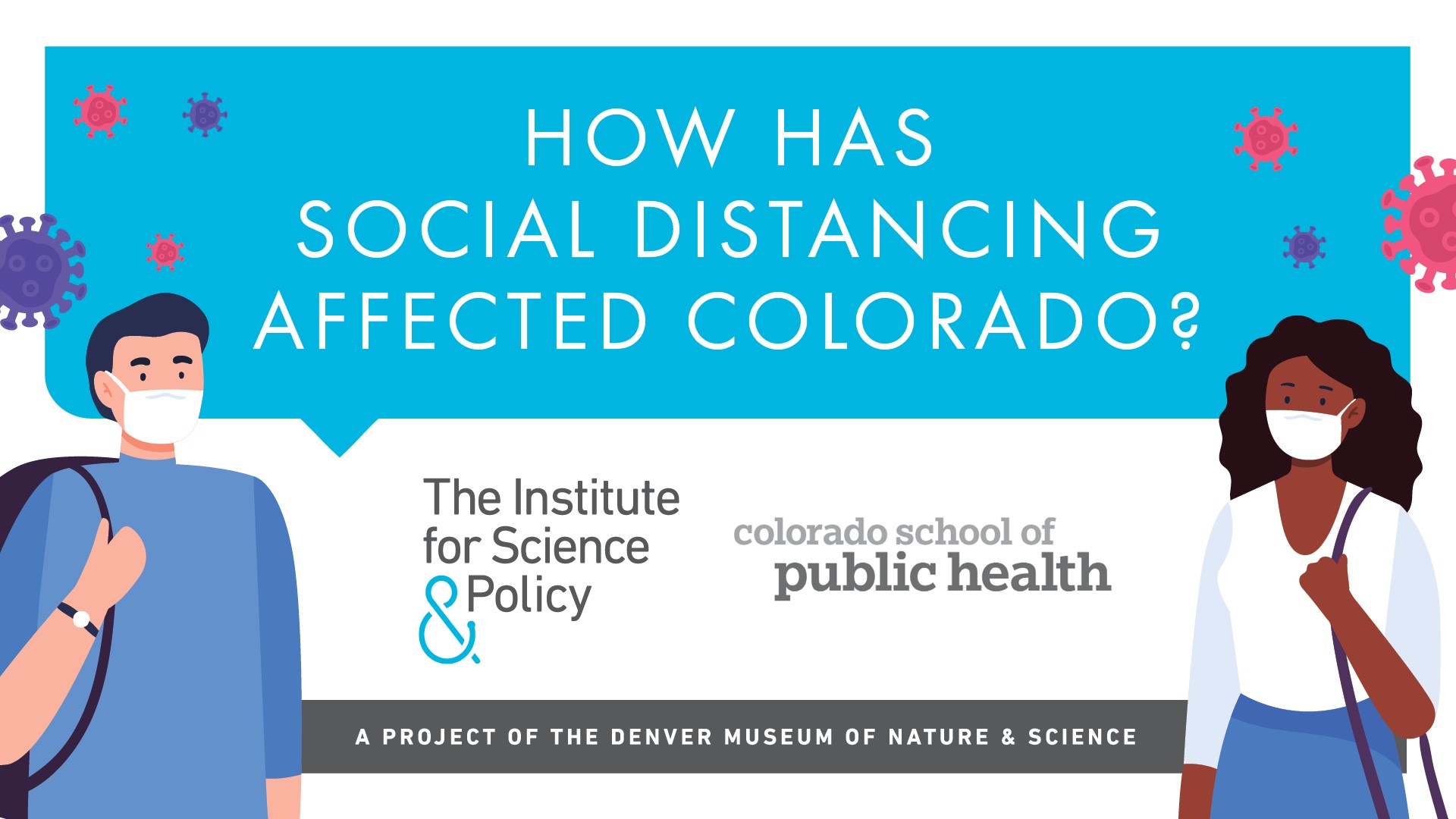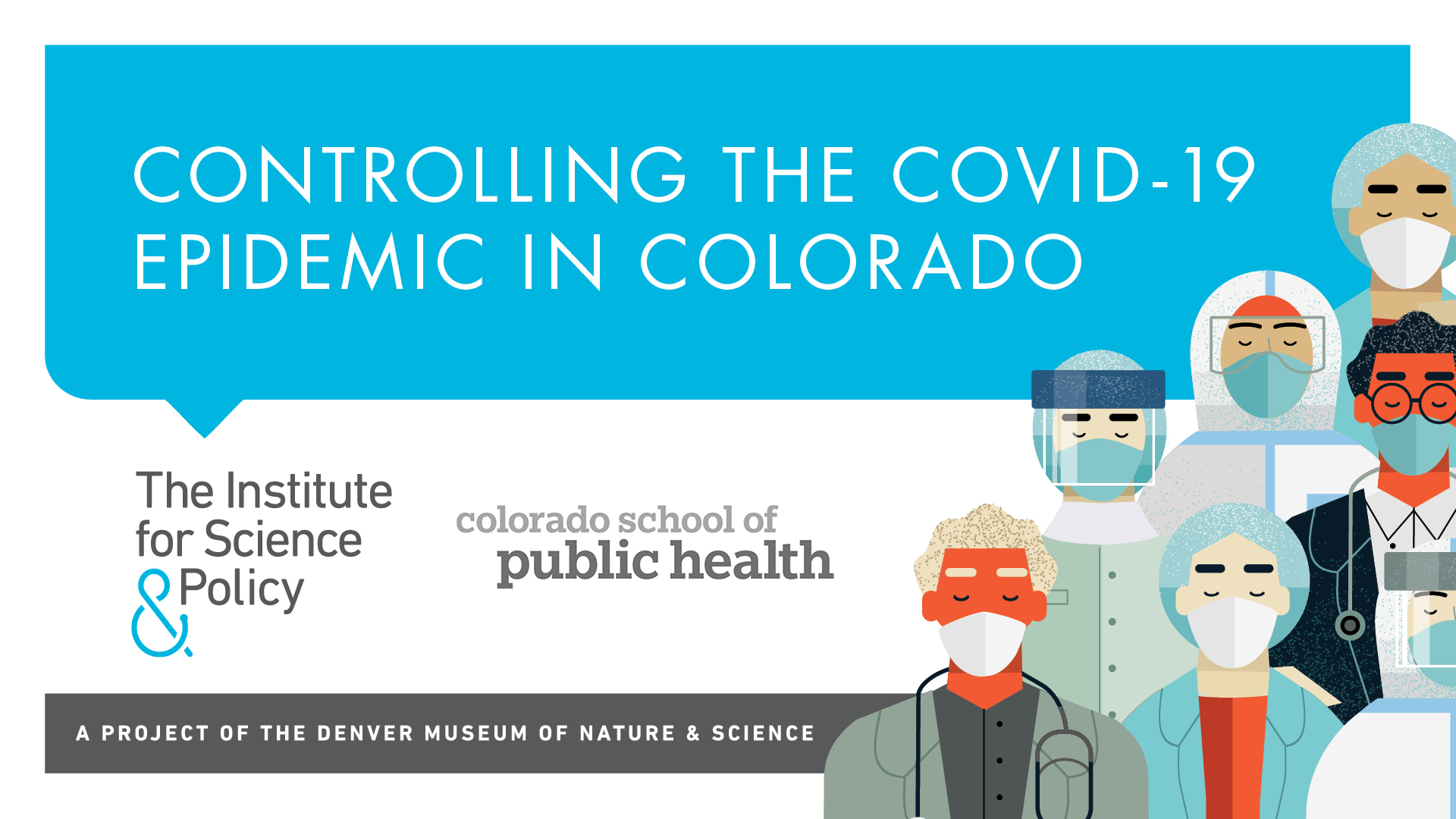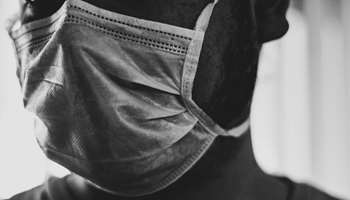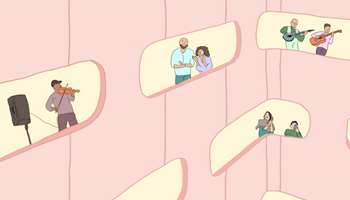COVID-19: A Virtual Conversation Series
A recurring series tracking the impacts of the pandemic in Colorado and beyond.
Presented in partnership with
A note from Dr. Jonathan Samet and George Sparks:
In 2020, as the COVID-19 pandemic began to profoundly alter our society, the Colorado School of Public Health and the Institute for Science & Policy began collaborating on a webinar series designed to provide timely, relevant information about the SARS-CoV-2 pandemic for everyone. In the face of the monumental science-meets-policy challenge of the pandemic, all of us — scientists, policymakers, medical practitioners, the general public — were united by the goal of taming the pandemic, learning in real time how to do so.
Over thirty episodes and two years later, our understanding of COVID-19 has increased significantly. We have developed a new shared vocabulary: social distancing, R-naught, asymptomatic transmission. Research has demonstrated the efficacy of wearing masks and shed light on the risks of aerosols. And, most saliently, we’ve witnessed the development of multiple safe and effective vaccines in record time. The epidemic’s end is becoming reality. Still, the past twelve months have taken a heavy toll. More than 550,000 American lives have been lost. States have been forced to balance public safety and health against economic impacts. First responders and other essential workers have made extraordinary sacrifices. We’ve seen the dangers of misinformation, amplified by polarization. Travel, education, business, science, gatherings, and even many basic human interactions have been changed forever. The impact of COVID-19 will stay with us for many years.
As we prepare for future health challenges, here are some of the key lessons:
- Communication matters. Clear, accurate, and actionable public health guidance is crucial and must continually be updated to reflect the best available knowledge.
- Leadership matters, too, but it’s up to all of us to follow through. We look to our leaders to set a good example and model responsible behavior, but then must take personal responsibility to reflect those behaviors in our own lives.
- Science can achieve remarkable things. It’s never perfect and is constantly evolving. But it’s usually the best guide we have at any given time for taking the actions needed.
This series has featured more than 40 subject matter experts, a testament to the breadth and scope of this virus’ effects on so many aspects of our lives. They also show the evolution of our collective knowledge, one episode at a time. We hope these episodes will serve as valuable historical documents for future generations, who will one day study this time period the way we have looked to our own past for insight.
Finally, this series would not have been possible without the support of our audience of over 20,000 households, representing so many communities in Colorado and beyond. We are honored and humbled to have been a part of your regular viewing schedule for so long, through so much. Thank you.
Watch All Episodes
March 2023: Looking Back and Looking Forward
Now that we have reached the three-year mark of living with COVID-19 in the US, public health experts are reflecting on the past and the path forward. Our panel discusses long COVID, plus reviews what we’ve learned about the virus, what has changed, and what the future may hold. Dr. Rachel Herlihy, State Epidemiologist at the Colorado Department of Public Health & Environment, Dr. Jerry A. Krishnan, Associate Vice Chancellor for Population Health Science and Professor of Medicine and Public Health at University of Illinois Chicago, and Dr. Jonathan M. Samet, Dean of the Colorado School of Public Health, join us for the latest developments.
March 2022: From Epidemic to Endemic
It is highly likely that the virus will become endemic, remaining in circulation for many years. As spring approaches and we look ahead with cautious optimism, what does that mean for public health in the future? Dr. Jonathan Samet, dean of the Colorado School of Public Health, Dr. Elizabeth Carlton, associate professor in the school's Department of Environmental & Occupational Health, and Scott Bookman, COVID-19 Public Health Response Incident Commander for CDPHE, join us to talk about the end of the Omicron wave, living with the virus long-term, and the ongoing need for preparedness around testing, therapeutics, and emerging variants.
December 2021: Pandemic Resiliency & Health Equity
Dr. Sandro Galea, Dean and Robert A. Knox Professor at the Boston University School of Public Health. As a physician, epidemiologist, and author of The Contagion Next Time, he'll discuss the social determinants of health and reflect on lessons learned about the societal consequences of an epidemic that has changed life as we know it.
October 2021: School Year Update
School is back in session, and across the U.S., COVID-19 policies in educational settings vary widely. In many cases, reinstated mask mandates have proven to be a flash point, stoking tensions between parents, school boards, lawmakers, and public health officials. Rico Munn, Superintendent of Aurora Public Schools, and Dr. Sean O'Leary, professor of pediatrics and infectious disease at the Colorado School of Medicine, join us to discuss the latest developments.
August 2021: Vaccine & Variant Update
Despite a springtime vaccination boom, the United States finds itself at a COVID-19 inflection point once again. The ascendent Delta variant has brought a spike in cases and hospitalizations, particularly in areas of the country where lingering vaccine hesitancy has slowed inoculation rates. Dr. Jennifer Nuzzo, Senior Scholar at the Johns Hopkins Center for Health Security and an Associate Professor at the Johns Hopkins Bloomberg School of Public Health, covers the latest on breakthrough infections and new mutations.
April 2021: Reflections On Our Pandemic Year
New and returning guests share their reflections on a year that re-shaped our world. Featured speakers include:
• Rachel Herlihy, MD, MPH/MSPH, State Epidemiologist for the Colorado Department of Public Health & Environment
• Cerise Hunt, PhD, MSW, Director for the Center for Public Health Practice and Assistant Professor in Community and Behavioral Health at Colorado School of Public Health
• Bobby LeFebre, Colorado Poet Laureate
• Traci Priebe, RN, BSN, CCRN, Charge Nurse in the medical ICU at the University of Colorado Hospital
• Jonathan Samet, MD, MS, Professor of Epidemiology and Environmental and Occupational Health and Dean of the Colorado School of Public Health
• George Sparks, President & CEO, Denver Museum of Nature & Science
March 2021: The New Normal for Business & Economics
The state of the economy encapsulates all of the challenges and tradeoffs inherent in navigating a once-in-a-generation pandemic. So where do we go from here? Check out our conversation with Michael Hancock, Mayor of Denver; Deborah Jordy, Executive Director of the Scientific & Cultural Facilities District; and Ed Sealover, Senior Reporter at the Denver Business Journal, who covered the latest trends across different sectors and provided an outlook on what the economic future will look like for cities and communities.
March 2021: The New Normal for Education
Due to COVID-19 disruptions, the role of schools in our society has perhaps never been in greater focus. Yet the pandemic may offer unexpected opportunities as well, ushering in new tools and structures that could help schools emerge stronger on the other side, better prepared to help their students develop both in person and online. We welcome Rebecca Holmes, President & CEO of the Colorado Education Initiative; Christie Imholt, District Policy Director in the Office of the Superintendent, Aurora Public Schools; and Landon Pirius, Vice President for Organizational Effectiveness, Student Affairs, and Strategic Initiatives for the Colorado Community College System to discuss.
February 2021: The New Normal for Science & Public Health
The long-term effects of this disruptive year of COVID on the scientific enterprise may not be fully realized for a decade. Dr. Harvey V. Fineberg, President of the Gordon and Betty Moore Foundation, joins us to talk about how the medical and scientific worlds have shifted as we eventually move beyond the pandemic. What has changed for scientists in terms of funding, research focus, public trust, misinformation, and the place of science in our society? And what are his hopes for the future once COVID-19 recedes?
February 2021: Variants & Mutations
Viruses are ever-changing by nature, and each mutated strain poses new and different challenges. What can epidemiology tell us about these new SARS-CoV-2 variants? And how can public health officials stay one step ahead? Check out our recent discussion with Dr. Angela Rasmussen, a virologist at Georgetown University's Center for Global Health and Security, discusses the evidence for higher variant transmissibility and what we know about the efficacy of existing vaccines against mutations.
January 2021: The National Response w/ Dr. Tom Frieden
Dr. Tom Frieden, President and CEO of Resolve to Save Lives and the former director of the Centers for Disease Control and Prevention joins us to discuss the role and responsibilities of the federal government in organizing large-scale public health responses, the importance of accountability and transparency, and assess the 2021 state of play.
January 2021: A Conversation w/ Governor Jared Polis
Since the first case of COVID-19 was confirmed in Colorado on March 5, 2020, Governor Jared Polis has led the state's response, balancing public safety with social activity and the economy. He shares his firsthand experiences and talks about what lies ahead for the new year.
December 2020: Reflections on 2020 w/ Dr. Nicholas Christakis
2020 has challenged us both as decision-makers and as human beings, forcing a collective reconsideration of what it means to live in a time of plague. But history and science can both be our guides if we allow them to be, argues Nicholas A. Christakis, Sterling Professor of Social and Natural Science at Yale University, who has studied the progression of the novel coronavirus across a range of disciplines.
November 2020: COVID-19 vs. Influenza
COVID-19 and influenza are both highly contagious respiratory illnesses that can manifest with similar symptoms. With flu season returning to the U.S., scientists and public health officials are closely monitoring the overlap and bracing for additional strain on healthcare resources. As the two diseases set out on a possible collision course, how should we be assessing risk and adapting responsibly? Jon Andrus, MD, Adjunct Professor and Director of Division of Vaccines and Immunization at the Colorado School of Public Health, and Suchitra Rao, MD, Associate Professor, Pediatrics-Pediatric Hospital Medicine at the Colorado School of Medicine, compare and contrast the two diseases.
October 2020: COVID-19 Open Forum
From testing to treatments to tracking the spread, we turn the floor over to our audience to find out what questions are on your mind and ask our panel of experts to weigh in. Featuring Michelle Barron, MD, Professor of Medicine-Infectious Disease at the University of Colorado School of Medicine, Jude Bayham, Assistant Professor of Agricultural & Resource Economics at Colorado State University, C. Neill Epperson, MD, Chair of Psychiatry at the University of Colorado School of Medicine, and Jonathan Samet, MD, MS, Professor of Epidemiology and Environmental and Occupational Health and Dean of the Colorado School of Public Health.
October 2020: COVID-19 in Colorado, Six Months In
Since March, state public health officials have been grappling with the challenges of the pandemic and implementing new policies at a rapid pace. How has Colorado’s response evolved since that first wave of cases in the spring, and what insights have we gained about communication, testing, tradeoffs, and the efficacy of public health guidance? Jill Hunsaker Ryan, MPH, Executive Director of the Colorado Department of Public Health and Environment, and Kacey Wulff, Senior Advisor for COVID-19 Response, Resilience, and Recovery in the Office of Governor Jared Polis, discuss the latest caseload data, update us on available public resources, and assess the state’s current level of infrastructure and preparedness before winter sets in.
September 2020: COVID-19 in the U.S., Six Months In
Georges C. Benjamin, MD, Executive Director of the American Public Health Association, joins us to highlight big picture lessons from the pandemic so far - including early missteps and ongoing course corrections that will likely shape the course of the coming year - as well as the state of the nation’s healthcare infrastructure and strategies to build resilience.
August 2020: Aerosols & Airborne Transmission
What does the current science tell us about exposure indoors? Shelly Miller, Professor of Mechanical Engineering at the University of Colorado Boulder, and Jonathan Samet, Professor of Epidemiology and Environmental and Occupational Health and Dean of the Colorado School of Public Health, discuss the science of viral aerosol transmission and the emerging importance of adequate building ventilation.
August 2020: Economic Impacts
COVID-19 has sent shock waves through every sector of the U.S. economy, leaving businesses to navigate an uncertain future and millions of workers out of a job. While some industries look poised to bounce back quickly once the pandemic recedes, others may struggle and/or be permanently reshaped. What will meaningful recovery look like in Colorado, and when might it arrive? Join us to discuss the state of the economy and forecast the rest of 2020 with Kelly Brough, President and CEO of the Denver Metro Chamber of Commerce and Richard Wobbekind, Associate Dean for Business & Government Relations at the University of Colorado Boulder’s Leeds School of Business.
August 2020: COVID-19 in Latin America
We’re taking an international view of the epidemic with Dr. Edwin Asturias, Professor of Pediatrics-Infectious Disease at the CU School of Medicine, Professor of Epidemiology and Director of Latin American Projects for the Center for Global Health at the Colorado School of Public Health and Dr. Mauricio Hernández Ávila, Director of Economic and Social Benefits at the Mexican Institute of Social Security (IMSS), as they share stories from Latin American communities, discuss commonalities with the U.S. public health response, and outline strategies to help improve care and prevent humanitarian crises amidst a pandemic.
August 2020: Mental Health
For many Americans, the stresses of COVID-19 extend well beyond the virus itself. We may be feeling isolated after months of physical distancing, fearful for our own personal safety, or anxious about household finances and the state of the economy. Frustration, helplessness, depression, exhaustion, anger, grief ─ our emotions can run the gamut, and no two people will ever navigate trauma in quite the same way. Mercedez Lang and Michelle Tijerina, both practitioners and ambassadors for the Healthy Living Team at the Mental Health Center of Denver, discuss recent trends and data surrounding mental health, strategies to stay connected with others during times of change, and other educational enrichment opportunities that are available as we navigate the new normal.
August 2020: Zoonotic Spillover & Emerging Viruses
COVID-19 isn’t the first virus to make the leap from animals to humans, and if history is any guide, it won’t be the last. Novel zoonotic diseases can persist benignly inside an animal host for years, waiting patiently for an opportunity to jump to a new species and wreak havoc. What have researchers learned that might help us prevent future global outbreaks? We chat about spillover with Brian Foy, PhD, and Tony Schountz, PhD, both Professors in the Department of Microbiology, Immunology, and Pathology at Colorado State University.
July 2020: Mid-Summer Update
Amidst a nationwide resurgence of COVID-19, Colorado scientists, health officials, and policymakers continue to closely monitor the disease’s progression within the state. We assess the “state of the state” with Jonathan Samet, MD, MS, Professor of Epidemiology and Environmental and Occupational Health and Dean of the Colorado School of Public Health. Later, he's joined by John M. Douglas, Jr., MD, Executive Director of the Tri-County Health Department, and Karen Koenemann, Public Health Director for Pitkin County, for a discussion on how different areas of Colorado face different challenges in their respective public health responses.
July 2020: Race and Inequality (Part Two)
The systemic inequities in the American healthcare system existed long before COVID-19 ever arrived. Throughout history, Black, Latino, Native, and Indigenous communities have borne a disproportionate burden in public health crises due to a lack of affordable and accessible treatment options. We discuss outreach and engagement strategies as well as ways to bridge the wellness divide with a panel of distinguished guests:
• Alisha Brown, MNM, Senior Vice President, The Foundation for Sustainable Urban Communities and Director of the be well Health and Wellness Initiative
• Michael Cortés, MSW, MPP, PhD, Scholar in Residence and Special Community Member at the DU Graduate School of Social Work and Executive Director of the Colorado Latino Leadership, Advocacy & Research Organization (CLLARO)
• Jennifer Ho, PhD, Director of the Center for Humanities & the Arts and Professor of Ethnic Studies at the University of Colorado Boulder and President of the Association of Asian American Studies
July 2020: Race & Inequality (Part One)
COVID-19 has illustrated structural inequities in the American healthcare system that have persisted for centuries. Black Americans are dying of the virus at a higher rate than whites, despite making up a smaller percentage of the population. Majority-minority communities commonly lack access to testing sites and other medical resources. We’ll discuss the history of healthcare inequality, trust (and mistrust) of health practices, data from the current outbreak, and possible ways forward with a panel of distinguished guests:
• Fernando Holguin, MD, Director of the Latino Research & Policy Center at the Colorado School of Public Health and Professor of Medicine-Pulmonary Sciences & Critical Care and Director of Asthma Clinical and Research Programs at the University of Colorado School of Medicine
• Cerise Hunt, PhD, MSW, Director for the Center for Public Health Practice and Assistant Professor in Community and Behavioral Health at Colorado School of Public Health
• Spero M. Manson, PhD, (Pembina Chippewa), Distinguished Professor of Public Health and Psychiatry, Director of the Centers for American Indian and Alaska Native Health, and the Colorado Trust Chair in American Indian Health within the Colorado School of Public Health
June 2020: Misinformation & Misunderstandings
As COVID-19 spread rapidly around the world, so too did myths, exaggerations, and outright falsehoods. The flood of misinformation was often powerful enough to shape public perception and policy decisions. Steven Goodman, MD, MHS, PhD, Associate Dean of Clinical and Translational Research and Professor of Epidemiology and Population Health and Medicine at Stanford University, and Elizabeth Skewes, PhD, Department of Journalism Chair and Associate Professor in the College of Media, Communication and Information at the University of Colorado Boulder discuss how COVID-19 misinformation takes hold in the discourse and how we as citizens and the media can apply critical thinking principles to assess what we’re seeing.
June 2020: The Summer of COVID-19
Summer is typically the season of camping, grilling, and lounging by the pool, but some of our favorite warm weather activities could look and feel very different this year due to ongoing COVID-19 precautions. So what should Coloradans expect over the next few months? Is it safe to send kids to camp? Will I be able to go swimming? Will vacation destinations be open for business? And will the coronavirus make a comeback? Join us for an audience-driven conversation with Rachel Herlihy, MD, MPH/MSPH, State Epidemiologist for the Colorado Department of Public Health & Environment and Jonathan Samet, MD, MS, Professor of Epidemiology and Environmental and Occupational Health and Dean of the Colorado School of Public Health.
June 2020: Ethics in the Age of COVID-19
The COVID-19 pandemic has raised a number of complicated ethical questions for society, including if and when it is acceptable to restrict individual liberties to protect the public by enforcing quarantines, face masks, or event cancellations. In light of this, how can policymakers, scientists, and citizens best navigate these murky moral waters? And what do we owe to ourselves and to each other as human beings in the face of this global crisis? Join us as we discuss the ethics of COVID-19 with Matthew Wynia, MD, MPH, FACP, Professor of Medicine and Public Health and Director of the Center for Bioethics and Humanities at the University of Colorado Anschutz Medical Campus.
May 2020: Technology & The Path Forward
Colorado’s research community has responded swiftly to the COVID-19 challenge, with new projects already underway on vaccine development, diagnostic tools, biomedical countermeasures, and food system impact mitigation. Alan Rudolph, Ph.D., Vice President of Research at Colorado State University, joins to discuss the creative and innovative new ways that researchers are tackling this novel disease and draw upon his decades of experience in both biomedicine and global security to address how today’s infrastructure development can help build tomorrow’s more resilient societies.
May 2020: On the Front Lines
As the battle against COVID-19 unfolds each day in America’s hospitals, doctors, nurses, respiratory therapists, and other caregivers are working tirelessly to diagnose, treat, and improve patient outcomes. Hear firsthand perspectives from a pair of Colorado medical professionals Marc Moss, MD, the Roger S. Mitchell Professor of Medicine and Head of the Division of Pulmonary Sciences and Critical Care Medicine at the University of Colorado School of Medicine, and Traci L. Priebe, RN, BSN, CCRN, a Charge Nurse in the medical ICU at the University of Colorado Hospital.
May 2020: Testing in Colorado
For weeks, the availability and accessibility of COVID-19 testing has dominated the national discourse. Who can get tested? How quickly do the results come back? Is there enough widespread testing to identify and contain new hotspots? In such a rapidly-shifting landscape, guidance can change quickly, leaving the public with more questions than answers. In the third part of our ongoing coronavirus webinar series, you’re invited to tune in for a discussion on Colorado’s approach to testing and how it fits into the state’s broader response. Kyle M. Brown, Ph.D., Deputy for Mass Testing and Isolation Support on Colorado’s COVID Innovation Response Team, separates fact from fiction.
May 2020: Social Distancing
Coloradans have increased their time spent at home since mid-March following statewide policy interventions implemented by Governor Polis and increased social distancing guidelines set by essential businesses. Using digital trace data, scientists have been able to study general patterns in population mobility during the COVID-19 pandemic. Jude Bayham, Ph.D., Assistant Professor of Agricultural & Resource Economics at Colorado State University discusses the study’s key findings.
May 2020: Vaccines & Therapeutics
The search for a COVID-19 vaccine has taken center stage, with all eyes on scientists’ efforts to develop safe and effective treatments at a breakneck pace. But what will a successful vaccine rollout look like, and when might it arrive? Michelle Barron, MD, and Thomas Campbell, MD, from the University of Colorado School of Medicine talk about process of clinical trials, what history tells us about possible outcomes, and which hurdles a vaccine would need to clear before it can be confidently distributed to the public.
April 2020: Controlling the COVID-19 Epidemic in Colorado
In our premiere episode, Jonathan Samet, MD, MS, Professor of Epidemiology and Environmental and Occupational Health and Dean of the Colorado School of Public Health, discusses solutions and challenges around slowing the spread of the disease, as well as insights gained from working closely with state officials on their public health guidance.
Further Reading

Stay in touch.
Sign up to receive The Ampersand, our monthly e-newsletter. We'll also let you know about upcoming events and content launches.
Yes, keep me up to date.

